“Your state in the hands of the Imam of the age should be like a d e a d b o d y in the hands of a ghassal [one who bathes the body for burial]. A l l your aims and wishes should be dead and you should attach yourselves w i t h t h e I m a m as carriages are attached with an engine. Then, see for yourselves that you emerge out of darkness or not. […] We have been granted this age [of Khilafat] after thirteen hundred years and [if it is not safeguarded], it will never come again in future till the Day of Resurrection. Thus, be grateful for this blessing because t h a n k f u l n e s s increases the blessings.”
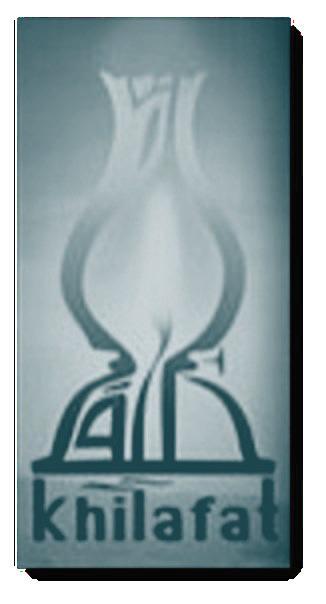


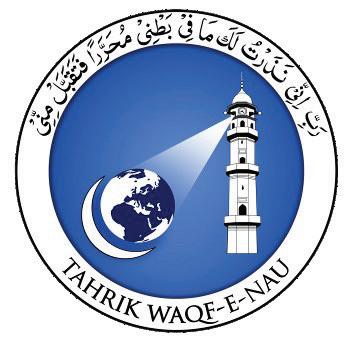
 Hazrat Ha kim Maulvi Nooruddin, said: ra Kh alifatul Masih I
Hazrat Ha kim Maulvi Nooruddin, said: ra Kh alifatul Masih I
- - 3 - - -- - - -
Issue 46
April-June 2023
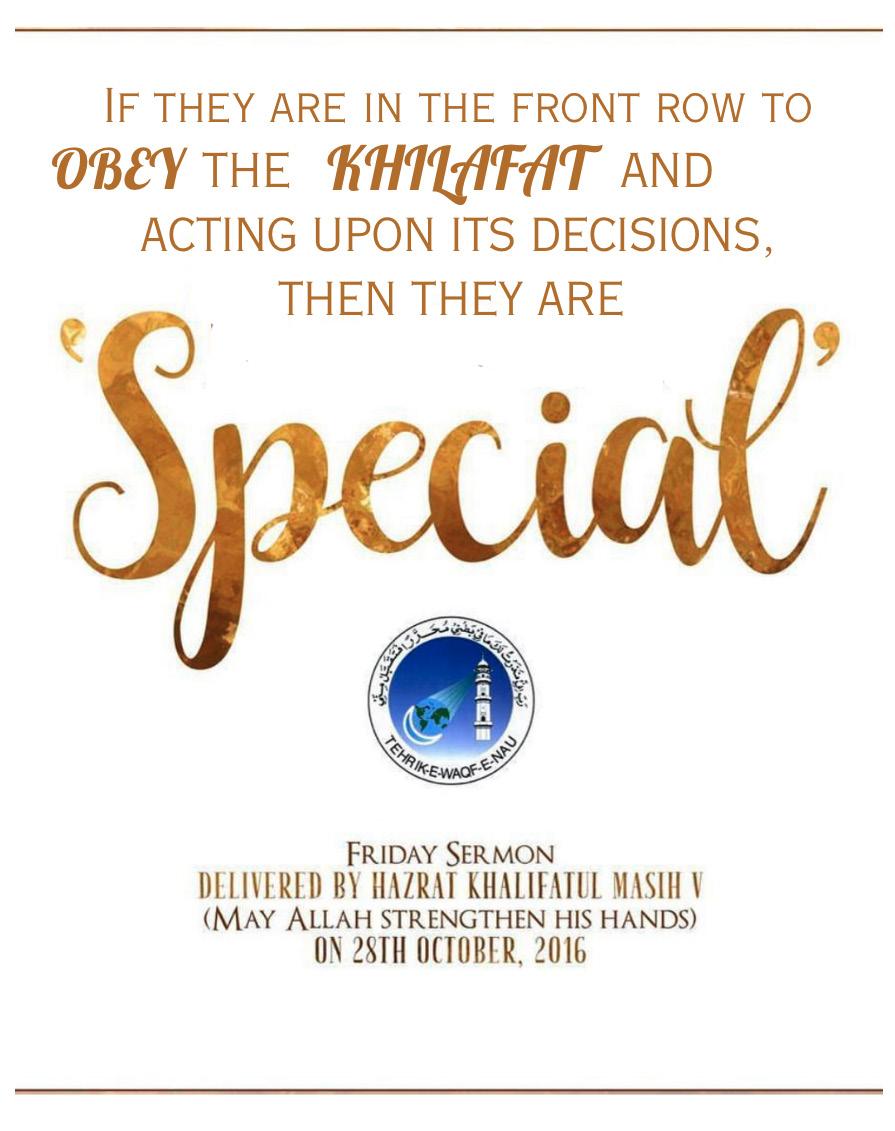
From the Editor...
As humans, we are constantly making choices, which are refected in our actions. However, at times it can be diffcult to make the right choice when the wrong path may seem like the easier route. We are, therefore, extremely blessed that Allah the Almighty has sent the perfect and complete guide for us in the form of the Holy Qur’an. There is no necessity of humans, whether material, spiritual, moral or otherwise which has not been covered by the teachings of the Holy Qur’an.
Expounding on the excellences of the Holy Qur’an in his Friday Sermon on 7th April 2023, Hazrat Mirza Masroor Ahmad (May Allah be his helper), quoting the Promised Messiahas said:
“It is a distinction of the Holy Qur’an that not only does it raise a person’s intellect and knowledge to a level of excellence, but it does the same for a person’s actions. Furthermore, being true followers of the Holy Qur’an and acting according to its teachings will result in the seeing of signs and the fulflment of prayers. It is yet another excellence of the Holy Qur’an and its teachings, that those who follow and adhere to them attain unmatched blessings.”
As Waaqifaat-e-Nau it is our duty to follow the teachings of the Holy Qur’an to the highest standard. In his address to Waaqifaat-e-Nau on 29th April 2023 beloved Hazooraba said:
“You have pledged your lives for the service of your faith and so, it is especially incumbent upon you to study the Qur’an and identify its various teachings. Every command of the Qur’an is vitally important and must not be taken lightly.”
May Allah enable all of us to follow this beautiful guidance and embody the teachings of the Holy Qur’an in our daily lives. Ameen
In this issue of Maryam Magazine our readers can enjoy articles including ‘The First Custodian of the Holy Qur’an’, ‘Address by Hazrat Khalifatul Masih Vaba at the National Waaqifaat-e-Nau Ijtema 2023’, ‘Waaqifaat-e-Nau Ameen Experience with Beloved Hazooraba’ and ‘Biomedical Science: The Subject leading to a World of Opportunities’.
ENGLISH EDITOR
CHIEF EDITOR
Zanubia Ahmad
ASSISTANT CHIEF EDITORS
Dure Jamal Mala
Nayla Muzamil
ENGLISH EDITOR
Hina Ahmedi
ENGLISH SUB-EDITOR
Hamooda Arif
EDITORIAL BOARD
Sabah Un Noor Tahir
Hibba-Tul Mussawir
Maleeha Mansur
Meliha Hayat
Salma Manahil Malik
Tahmeena Shamim Tahir
Mashel Chaudhry
Samina Yasmeen Arif
Amatul Wakeel Maha
Sameera Mirza
Kashifa Qamar
Safna Nabeel Maham
COVER DESIGN
Hina Farooqi
PAGE DESIGN&SETTING
Soumbal Qureshi
Naeema Amjad
Atiyya Wasee
Naila Fowad
Hina Farooqi
Zara Tahir Ahmad
PRINTED UNDER THE CENTRAL OFFICE WAQF-E-NAU
Do you have any comments, suggestions or want your article featured in our next edition?
Email us at: chiefeditor@maryammagazine.org
MANAGER
Luqman Ahmad Kishwar
PRINTERS
Raqeem Press, Tilford UK
Hïñå Åhmëdï Maryam | 1
03. The Holy Qur’an
04. Hadith
05. Writings of the Promised Messiahas
06. The Life and Character of the Seal of Prophetssaw
09. Quote on the Beauty of the Holy Qur’an | The Promised Messiahas
10. Waqf in the Field: Biomedical Science -The Subject leading to a World of Opportunities | Humaira Omer Mustfa
14. Reflections | An Excerpt from the Personal Accounts of Abid Khan Sahib
16. Waaqifaat-e-Nau UK Ijtema 2023 | Address by Hazrat Mirza Masroor Ahmad, Khalifatul Masih V(May Allah be his Helper)
23. Tarbiyyat Page
26. Quote on the Beauty of the Holy Qur’an | The Promised Messiahas
27. “The Qur’an is my Sustenance” | Hazrat Khalifatul Masih Ira
28. “God of His Grace, Appointed Angels for my Instruction” | Hazrat Musleh Maudra
30. The Holy Qur’an: The Only Perfect Book | Hazrat Khalifatul Masih IIIrh
31. Reciting the Holy Qur’an with Comprehension | Hazrat Khalifatul Masih IVrh
32. Ponder over the Holy Qur’an | Hazrat Khalifatul Masih Vaba
34. Kids' Spread
38. The First Custodian of the Holy Qur’an | Ayesha Mahmood Malik
41. Poem: Riddance from Di culties | English translation of selected verses from Durr-e-Sameen by Hazrat Mirza Ghulam
Ahmadas
42. Report: National Waaqifaat-e-Nau Ijtema UK 2023 | Laiqa Bhatti
47. Arts and Crafts – How to make a Pencil Holder
48. Story: The Legend of the Dragon and the Phoenix
50. Waaqifaat-e-Nau Ameen Experience with Beloved Hazooraba

APRIL-JUNE 2023 ISSUE 46
CONTENTS
2 | Maryam
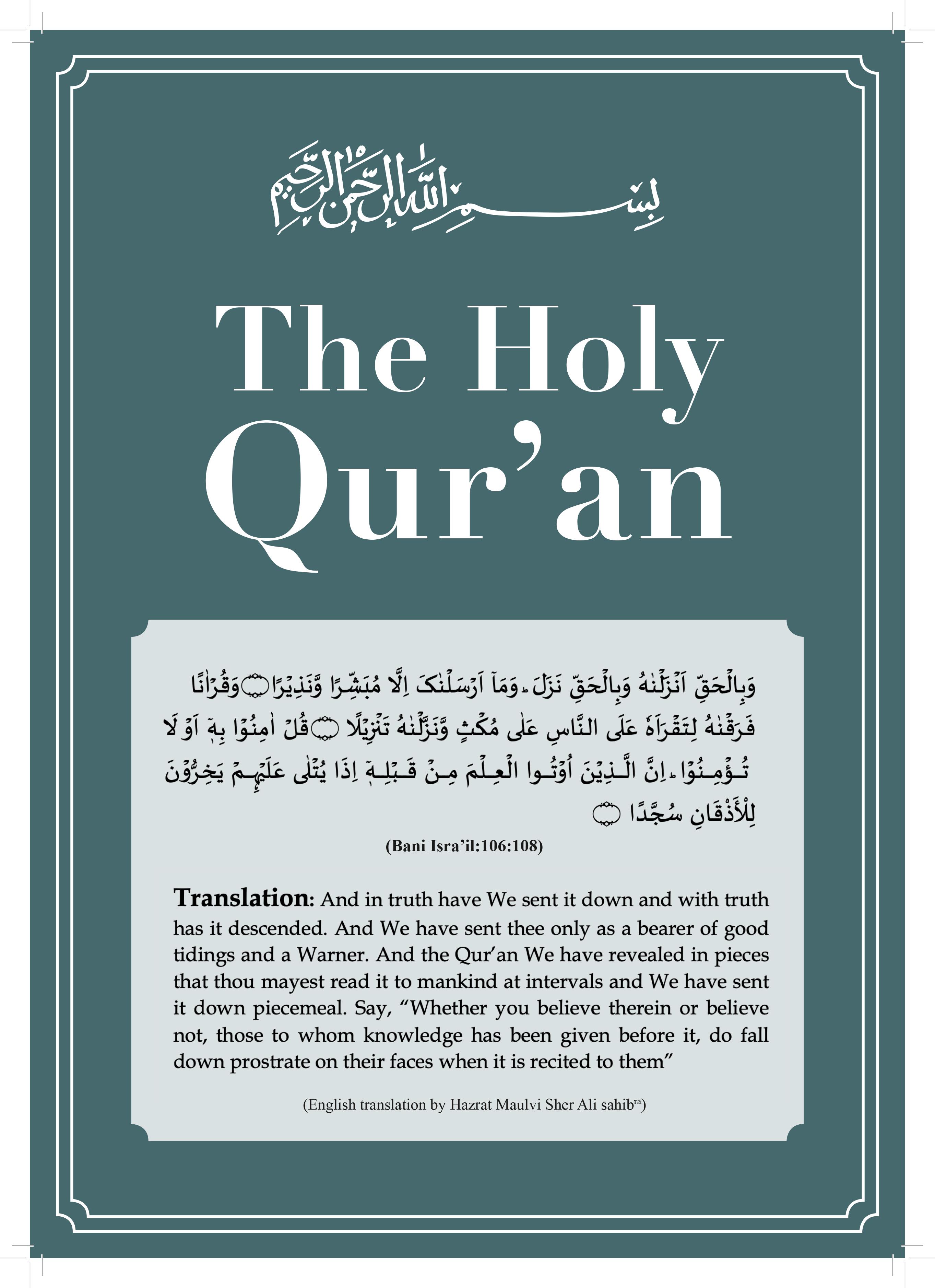
Maryam | 3
Hadith
(Sayings of The Holy Prophet)
(May Peace and Blessings of Allah be upon Him)
Translation:
Abu Musa Ash’ari relates that the Holy Prophetsaw said: The case of a believer who recites the Qur’an is that of fruit which is fragrant and delicious; and the case of a believer who does not recite the Qur’an is that of fruit which has no fragrance but is sweet to the taste; and the case of a hypocrite who recites the Qur’an that of fruit which is fragrant but tastes bitter; and the case of a hypocrite who does not recite the Qur’an is that of fruit which has no fragrance and tastes bitter.
(Gardens of the Righteous, p.186-187 Hadith No. 999)
ى سوم يبأ نع یرعشل ا، لاق : لاق ا لوسر لص ا ى ہیلع لسوم لثم نمؤلا نآرقلا أرقي يذلا لثم لا ةجرت بيط اهحير و اهمعط بيط . و لثم نمؤلا نآرقلا أرقي ل يذلا ا لثم ل ةرمتل اهل حير اهمعطو ولح . نآرقلا أرقي يذلا قفانلا لثمو اهحير ةناحيرلا لثم رم اهمعطو بيط . ك نآرقلا أرقي ل يذلا قفانلا لثمو ثم ل ةلظنحلا حیر اھل سیل و رم اهمعط . ملسم حیحص( ، اهرصقو نيرفاسلا ةلص باتك ) :جت 4 | Maryam
Writings of the Promised Messiahas
The Holy Qur’an is a Book which has proclaimed its own matchlessness and has claimed its own greatness, its wisdom, its truth, the beauty of its composition and its spiritual lights. It is not true that the Muslims have themselves put forward these excellences on behalf of the Qur’an. It sets out its own merits and excellences and puts forward its matchlessness and peerlessness as a challenge to the whole of creation and calls out loudly: Is there any contestant? Its verities and fne points are not confned to two or three which would leave room for doubt on the part of an ignorant person, but are like the surging ocean and are visible in every direction like the stars of heaven. There is no truth that lies outside it. There is no wisdom that is not comprised in it. There is no light that is not obtainable through following it. These things are not without proof and are not mere words. It is an established and clearly proved verity which has been shining through 1,300 years. We have set out this verity in great detail in this book and have expounded the fne points of the Qur’an at such length as to constitute a surging ocean for the satisfaction of a seeker after truth.
[Brahin-e-Ahmadiyya, Ruhani Khaza’in, Vol. 1, pp. 662-665, footnote 11]
The Essence of Islam, Volume I, p.361
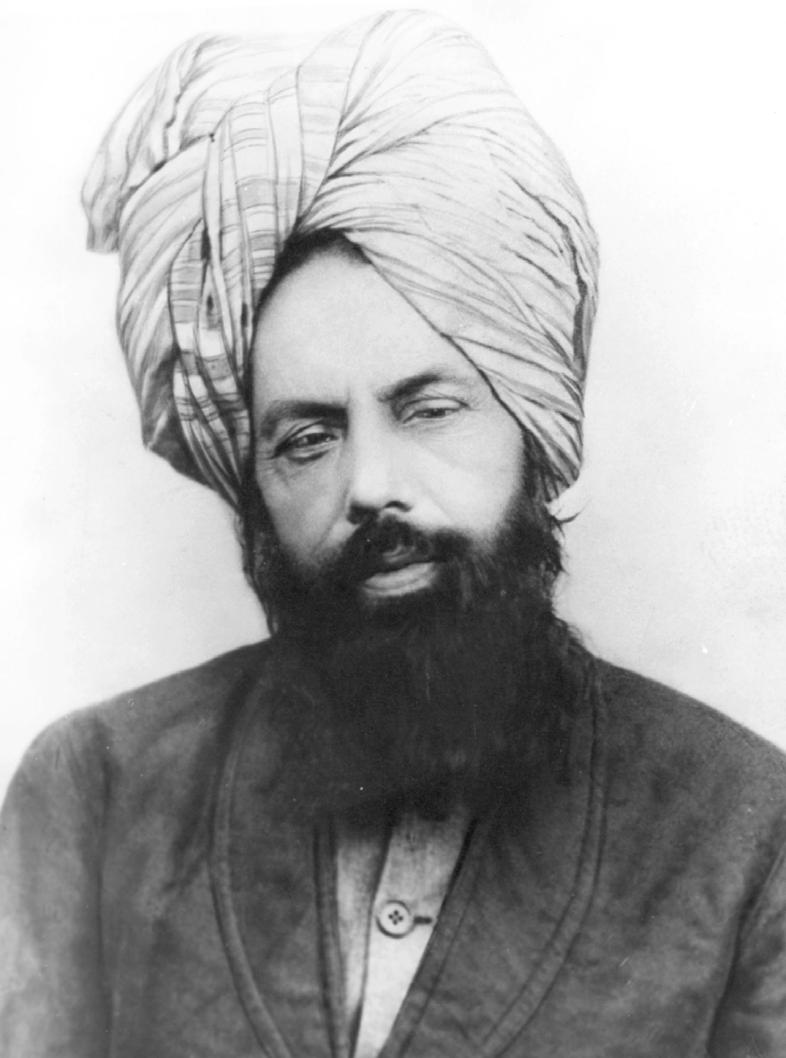 MATCHLESSNESS OF THE HOLY QUR’AN
MATCHLESSNESS OF THE HOLY QUR’AN
Maryam | 5
DEVICES ADOPTED TO SAFEGUARD THE TEXT OF THE QUR’AN
Taken from the book ‘Introduction to the Study of the Holy Qur’an’ by Hazrat Mirza Bashiruddin Mahmud Ahmad, Khalifatul Masih IIra
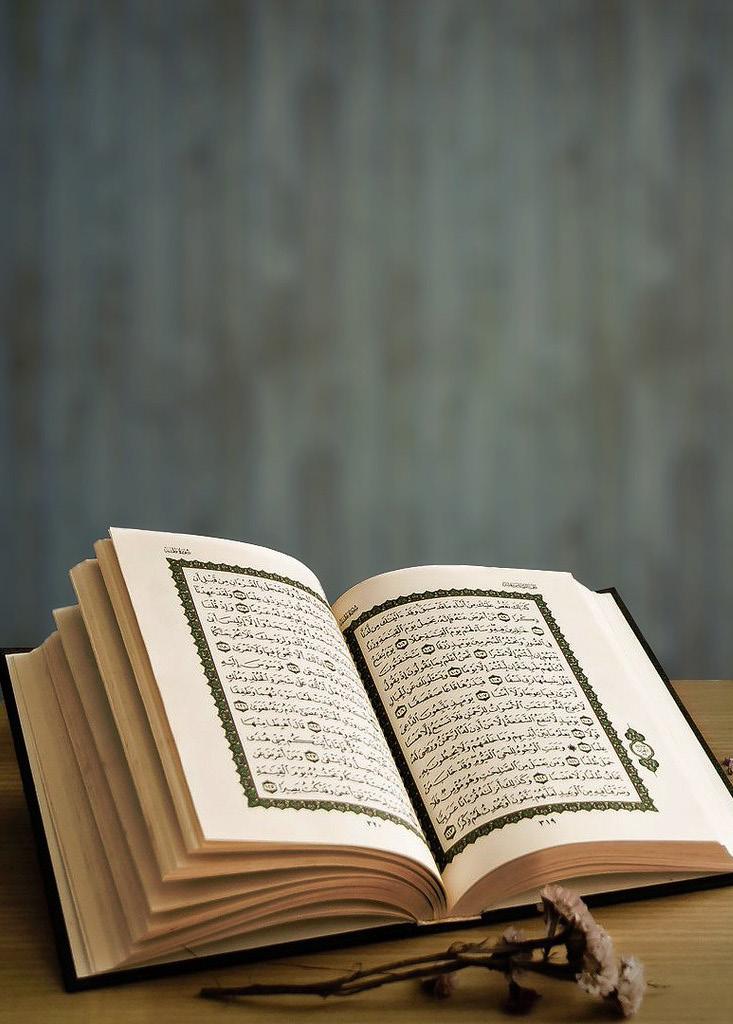
6 | Maryam
Waqifeen are advised to read the book ‘Introduction to the Study of the Holy Qur’an’. This is an inspiring introduction initially written as a prologue to the English translation and commentary of the Holy Qur’an. In this Issue of Maryam Magazine, we will be covering a few points from the ‘The Compilation of the Qur’an’ section.
(1)As soon as a revelation was received by the Holy Prophetsaw it was recorded in writing from his dictation. A number of persons are known to have been employed by the Holy Prophetsaw for this purpose. Of these the names of the following ffteen have been mentioned in the traditions (Fath-ul-Bari, Vol.9, p.19):
1.Zayd bin Thabit.
2.Ubayy bin Ka‘b.
3.‘Abdullah bin Sa‘d bin Abi Sarah.
4.Zubayr bin al-‘Awwam.
5.Khalid bin Sa‘id bin al-‘As.
6.Aban bin Sa‘id bin al-‘As.
7.Hanzalah bin ar-Rabi‘ al-Asadi.
8.Mu‘ayqib bin Abi Fatimah.
9.‘Abdullah bin Arqam az-Zuhri.
10.Shurahbil bin Hasanah.
11.‘Abdullah bin Rawahah.
12.Abu Bakr.
13.‘Umar.
14.‘Uthman.
15.‘Ali
Whenever the Holy Prophetsaw received a revelation, he would send for one of these persons and dictate to him the text of the revelation he had received.
s is well known the fve daily congregational prayers are obligatory upon every Muslim and a portion of the Qur’an must be recited in each of them so that every Muslim knows some portion of the Qur’an by heart. If every hundred out of the Prophet’ssaw Companions who numbered more than one hundred thousand had between them learnt the whole of the
Qur’an by heart the entire Qur’an must have been preserved in the memory of his Companions a thousand times over.
(3)The whole of the Law, doctrine, philosophy, moral precepts and other teachings of Islam are contained in the Qur’an. The building up and the fostering of a nation require the aid of all these. The Holy Prophetsaw used to train Muslims for the discharge of the multifarious duties and functions involved in the building up and direction of a civilised and cultured community. For instance, there were needed judges, jurists, expounders of doctrine and those who explained the legal and moral injunctions of Islam and these people could not adequately discharge their functions unless they had learnt the Qur’an by heart. All such people, therefore, were under the necessity of committing the entire Qur’an to memory.
(4)The Holy Prophetsaw used always to stress the meritoriousness of committing the Qur’an to memory, so much so that he is reported as having said that if a person commits the Qur’an to memory he would be saved from the torment of Hell. God had blessed the Holy Prophetsaw with Companions who were always eager to acquire merit in every way so that when he made this announcement very large numbers from among them began to commit the Qur’an to memory, including those whose enunciation was not very clear and who were not men of any learning at all. Imam Ahmad bin Hanbal has related on the authority of ‘Abdullah bin ‘Umar that a man came to the Holy Prophetsaw and said to him: “O Messenger of Allah! I memorize the Qur’an but my mind does not grasp its full meaning.” This shows that not only men of learning but even the common people were in the habit of committing the Qur’an to memory. Another tradition, related by Imam Ahmad bin Hanbal on the same authority, states that a man brought his son to the Holy Prophetsaw and said:
Maryam | 7
“O Messenger of Allah! this son of mine goes on reciting the Qur’an the whole day and spends his night in sleep.” The Holy Prophetsaw observed: “Then where is the occasion for you to worry? Your son spends the day in the remembrance of God and instead of committing any transgression at night spends it in restful sleep.” This shows that even the common people living at a distance from the Holy Prophetsaw had started the practice of committing the Qur’an to memory.
‘Introduction to the Study of the Holy Qur’an’ by Hazrat Mirza Bashiruddin Mahmud Ahmad, Page 260-261 https://www.alislam.org/library/books/ Introduction-Study-Holy-Quran.pdf

8 | Maryam
The Promised Messiahas
Malfuzat, Volume I, p.542, 1988 Edition (Urdu) English translation from Essence of Islam, Volume I, p.347
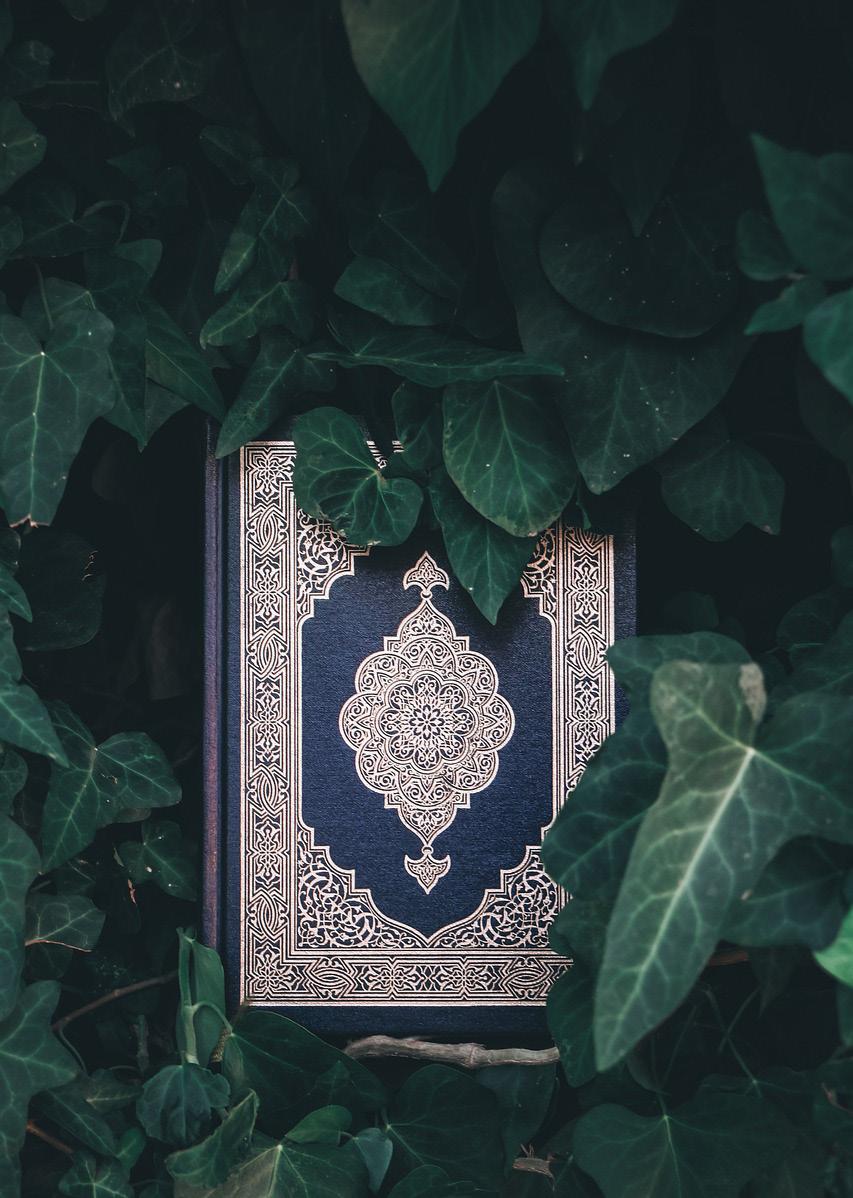
“The Holy Qur’an is a casket of jewels, but people are sadly unaware of it”
Maryam | 9
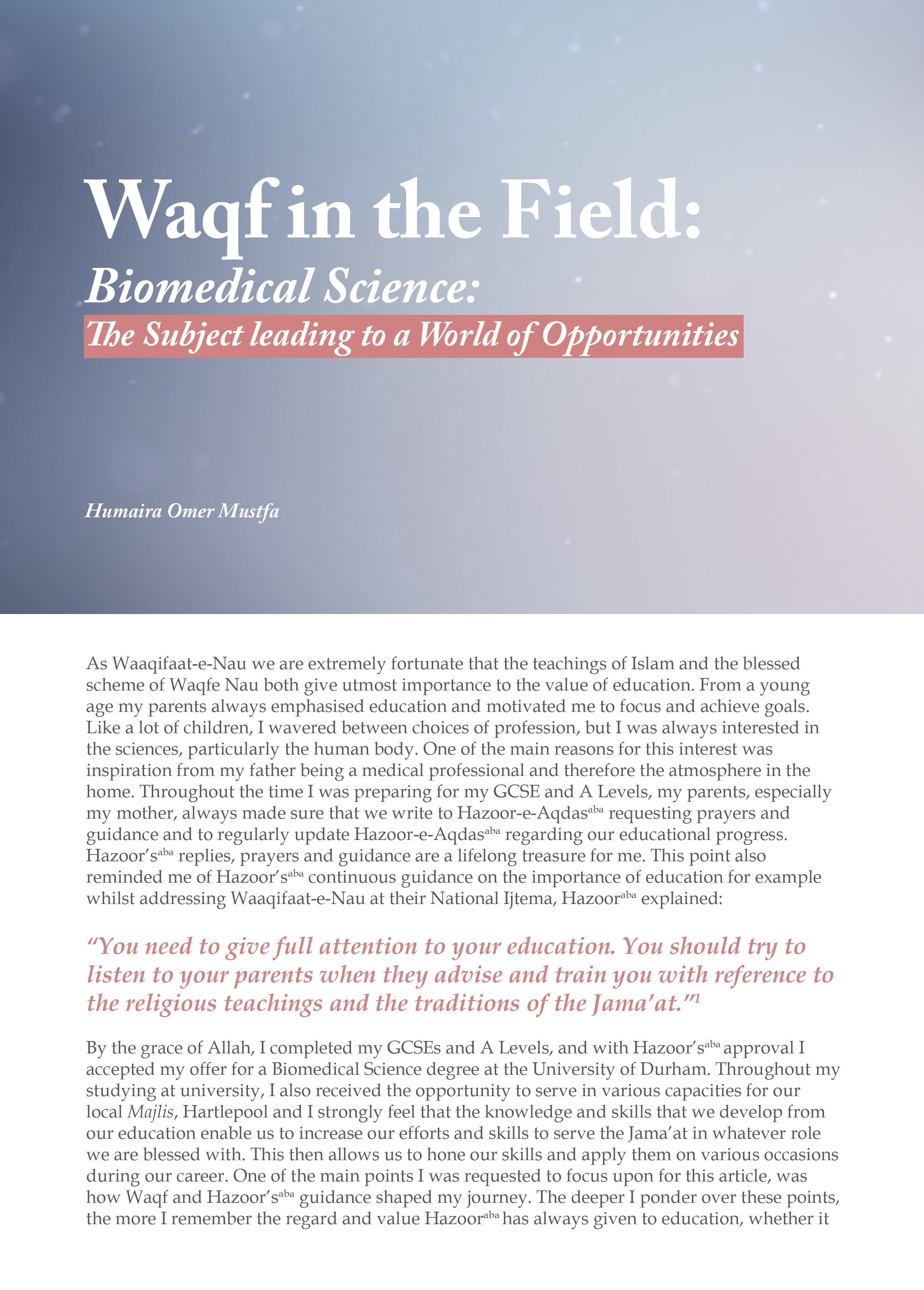
10 | Maryam
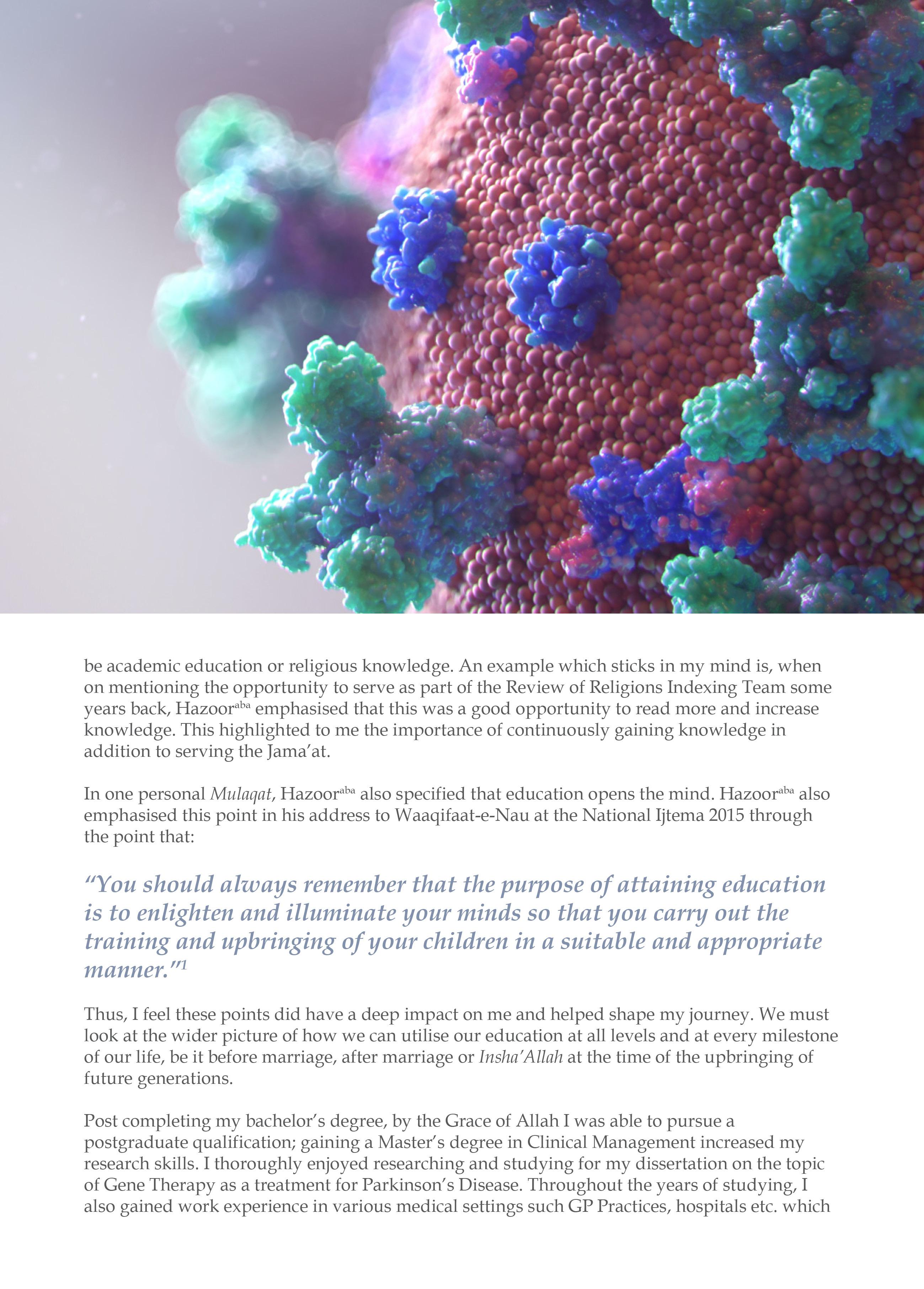
Maryam | 11
further enabled me to gain skills and learn about the diverse range of opportunities in the field o f science. The background gained through my Bachelors led me towards m y Master's degree where I developed a further understanding of research techniques and protocols in clinical environments. This, combined with work experience gave me a wider understanding of the worldwide scope for research. It is an honour for us as Ahmadis to have a system (Nizam) which enables u s to learn and enhance ourselves in various ways through the range of departments, events, and activities we are involved in as a Jama' at. I feel that it is a sole combination of prioritising our faith and focusing on our academics which help us to progress overall.

Amongst all activities, I also got involved in teaching, particularly private tutoring, now my main area career wise. My interest in the field developed so much that eventually, my main attention and focus became teaching. My education in Biomedical Science, research experience during my master's and varying Jama'at activities have led me to be able to teach a wide range o f subjects and age groups, mainly biology and chemistry. I am able to interact with individuals from varying cultures and backgrounds. The depths of understanding achieved through science degrees helps me to explain concepts to GCSE, A Level and university students in particular ways. I look forward to covering the minute and intricate details of varying systems created by Allah the Almighty such as the nervous system, cardiac cycle, genetics, and homeostasis to name a few. Revising and updating myself on latest research is necessary to provide as much benefit as a teacher to the next generation. Moreover, it is essential to keep up to date with the latest curriculum and teaching techniques to be able to guide students in the best possible manner. Research and teaching are both fields which Hazooraba regularly mentions the importance and need of. The Biomedical Science degree by the Grace of Allah opens the scope for both these fields as well as opportunities in other areas of scientific and medical fields.

12 | Maryam
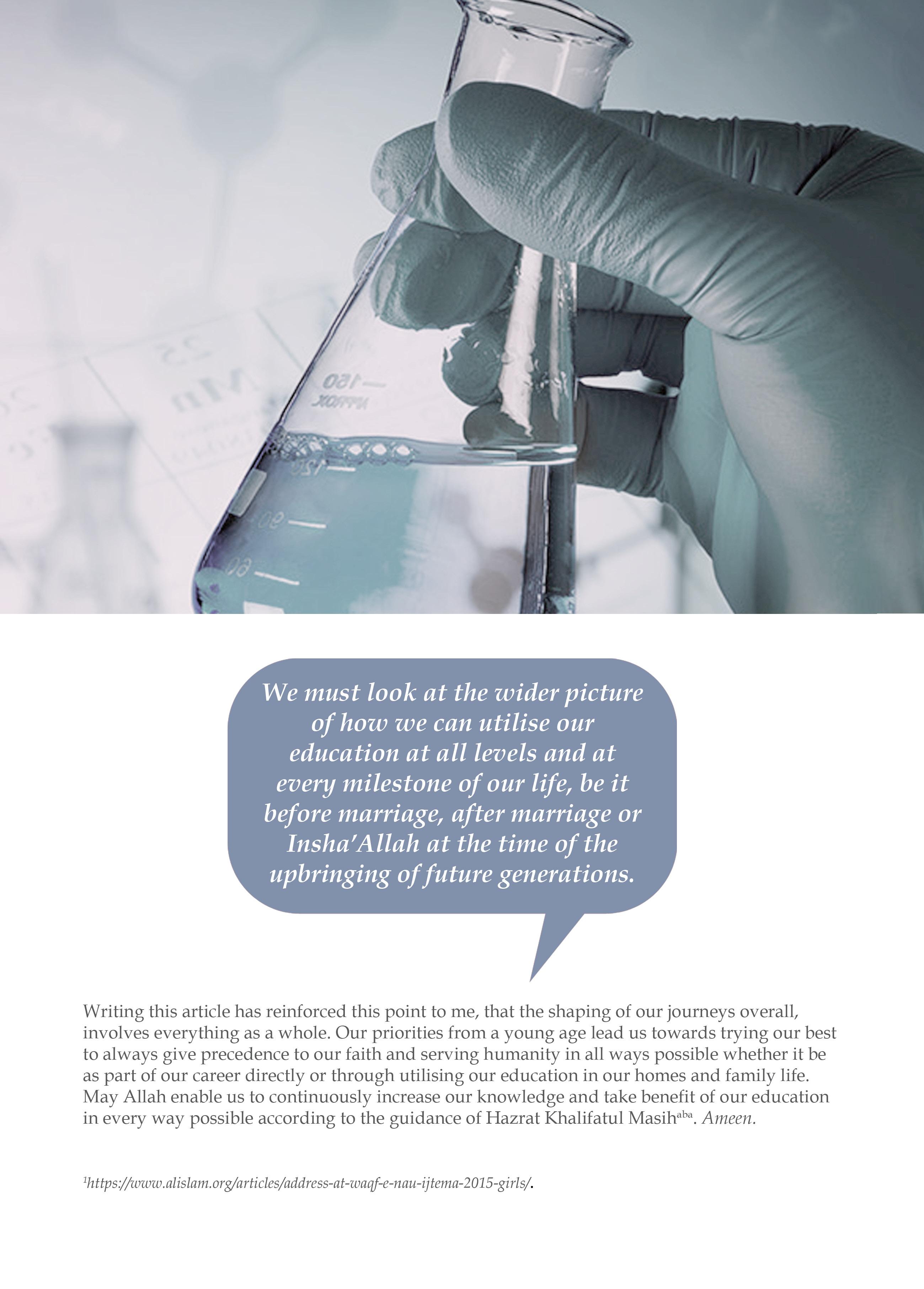
Maryam | 13
Reflections with Khilafat
An excerpt from the Personal Accounts of Abid Khan Sahib, Press Secretary to the Ahmadiyya Muslim Community, from September to October 2022 during the blessed tour of Hazrat Khalifatul Masih V (May Allah be his Helper) to the United States.
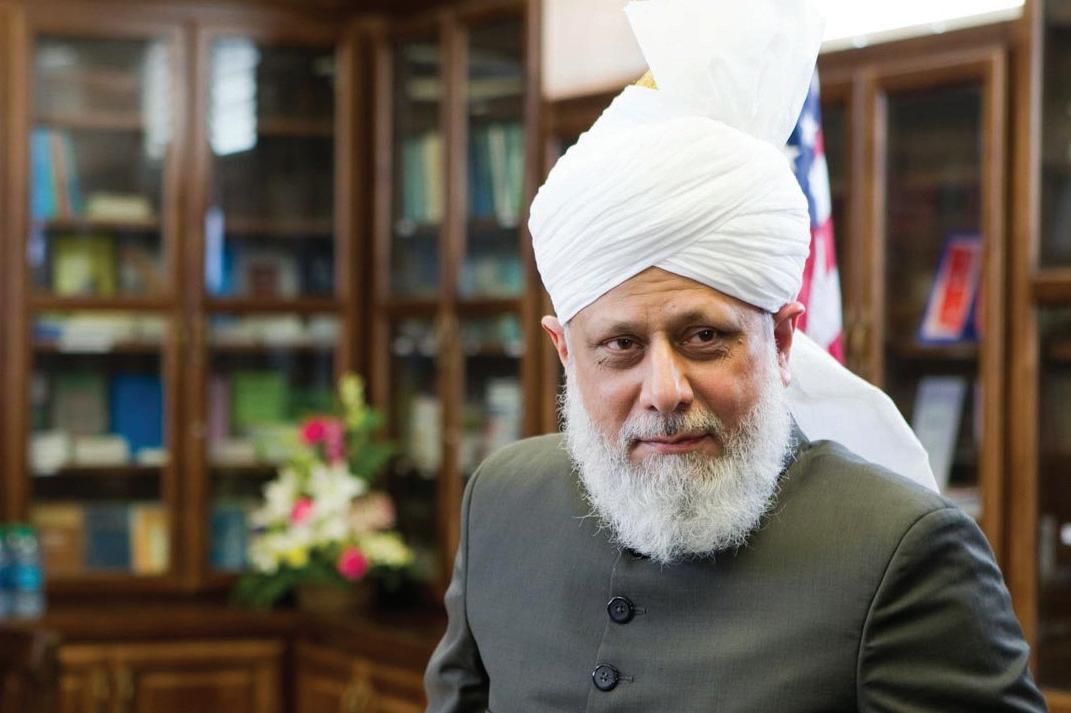
14 | Maryam
Memories of Hazooraba before Khilafat
During Hazoor’saba visit to the US, Ha z Muza ar Ahmad sahib, Nazir Islah-o-Irshad Muqami from Rabwah attended in Zion and Dallas. Ha z Muza ar sahib had the honour to work with Hazooraba prior to Hazoor’saba Khilafat and so I asked him about his experiences and memories. Mentioning the period when Hazooraba served in the National Amila of Majlis Khuddamul Ahmadiyya Pakistan in the late 1980s, Ha z Muza ar sahib said:
“Hazooraba, who we would call ‘Mian sahib’ at the time, did not speak a lot but rather chose his words carefully. Whenever he did speak his words had great weight attached to them and were always of bene t. Furthermore, Hazooraba was always extremely helpful and cooperative with all other people, no matter who they were. Whatever duties were assigned to Hazooraba he would do with diligence and he served as a Khadim with a spirit of absolute sincerity and humility.”
erea er, Ha z sahib mentioned the time when Hazooraba became Nazir-e-Ala in Pakistan. Ha z Muza ar Ahmad sahib said:
“In 1997, Hazoor’s father, Hazrat Mirza Mansoor Ahmad sahib passed away and Hazrat Khalifatul Masih IVrh appointed Mian sahib (Hazrat Mirza Masroor Ahmad) as Nazir-e-Ala. It was quite a surprise because it was assumed that Sahibzada Mirza Khursheed Ahmad sahib or Sahibzada Mirza Ghulam Ahmad sahib would be appointed as Nazir-e-Ala as they were more senior.
“Here, the revelation of the Promised Messihas regarding Hazoor’saba grandfather, Hazrat Mirza Sharif Ahmadra, that ‘Allah has appointed him as a leader contrary to expectation’ was ful lled in the person of Hazooraba, as it had been ful lled in the person of his father.”
Ha z Muza ar Ahmad sahib continued:
“Another revelation of the Promised Messiahas about Hazrat Mirza Sharif Ahmadra that Hazrat Khalifatul Masih IVrh stated was ful lled in the person of Hazrat Mirza Mansoor Ahmadrh was Allah has granted him life contrary to expectation’. ‘A er his demise, I wrote an article about Hazoor’saba father for publication in Al-Fazl and before submitting it to Al-Fazl I took it to Mian sahib and requested that he review it.
“ e next day he returned it and did not change any of the content about his father. e only part which he instructed me to cut was a paragraph towards the end where I had prayed using the words of the revelation that may Allah the Almighty greatly bless the life, status and leadership of (Hazrat) Mirza Masroor Ahmad sahib. is was most certainly due to his immense humility.”
Ha z Muza ar sahib told me how his relationship with Hazooraba changed a er he was appointed as Nazir-e-Ala. Now, Hazooraba was the senior most Jama’at o ce bearer in Pakistan and so Ha z sahib would seek his advice and instructions both in his work and personally.
Ha z Muza ar Ahmad sahib said:
“I always saw that when it came to any matter, Hazooraba would act with complete honesty, fairness and justice. I personally experienced this. One year in Ramadan, I was appointed in charge of the Eitikaaf arrangements. A er Maghreb prayers, Hazooraba noticed that the private living space in the mosque that I had was a bigger than the others because I had found a place in the corner. Very gently and so ly, Hazooraba mentioned to me that my space was larger and I realised that there should not be a di erence between the living space of the person in charge and others.”
Ha z Muza ar Ahmad sahib continued:
“I always found Hazooraba to be a wonderful guide and his counsel was always wise. For example, when my daughter graduated from university, my wife desired for her to do a Master’s Degree from Punjab University. However, I was of the opinion that it would be better to nd a suitable match for her marriage. I mentioned this to Hazooraba and he solved the dilemma in the best way. He advised that, according to her mother’s desire, my daughter should get admission at university. However, if during her Masters, a suitable match for marriage came about her education should not stop her from accepting it. So it happened that she took admission for the Master’s degree and during the nal period of her course she got engaged.”
A Personal Account | Part 2 | September – October 2022 https://www.pressahmadiyya.com/personal-acounts/2023/04/ the-blessed-tour-of-hazrat-khalifatul-masih-v-aba-to-theunited-states-2/ Maryam | 15
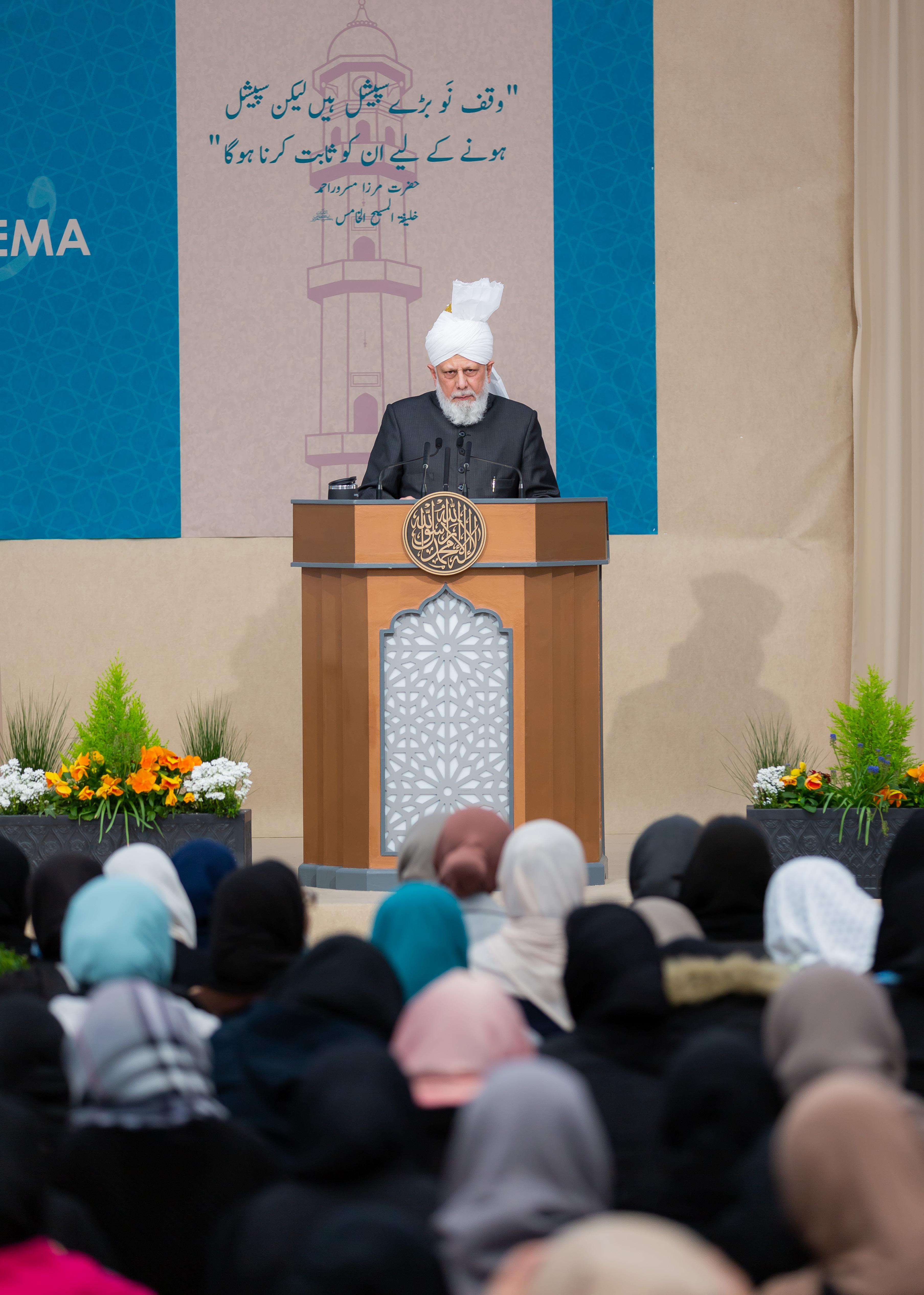
16 | Maryam
‘Seek to Embody Islam’s Teachings in All Respects’: Hazoor’s guidance to Waaqifaat-e-Nau UK

at their 2023 Ijtema
On Saturday, 29 April, Hazrat Khalifatul Masih V, may Allah strengthen his hand, arrived at the Baitul Futuh Mosque and led the Zuhr and Asr prayers before proceeding to the Tahir Hall to address the concluding session of the UK Waaqifaat-e-Nau Ijtema 2023.
Upon arrival, after conveying salaam to all attendees, Hazooraba invited Adeeba Sadaf Sahiba to recite a portion of the Holy Qur’an. The selected verses were 37-38 of Surah Aale-Imran. Rasheeqa Khan Sahiba presented the English translation.
Bushra Ghalib Sahiba was then invited to recite an Urdu poem written by Hazrat Musleh-eMaudra – Ehed shikni na karo, ehl-e-wafaa ho jao.
Hazooraba then asked Dr Maleeha Mansur Sahiba, Secretary Waaqifaat-e-Nau UK, to present the Ijtema report.
Maleeha Sahiba thanked Hazooraba for gracing the gathering with his presence. She informed Hazooraba and the audience about the schedule of the day starting from 10am and about the various group discussions and workshops that took place, for example, how to write letters to media outlets and how to better serve the Jama’at. 1,213 Waaqifaat-e-Nau were in attendance this year, as compared to 1,154 Waaqifaat in 2019, when the Ijtema last took place.
The Ijtema commenced at 10am with the opening session, chaired by Dr Fariha Khan Sahiba, Sadr Lajna Imaillah UK. Thereafer, according to Hazoor’saba guidance, the Ijtema programme was based on grou discussions. hese worksho s included how to fulfl our role as Waaqifaat-e-Nau, understanding how Islam champions the rights of women, the importance of developing a strong attachment to Khilafat, and a careers guidance workshop for older Nasirat. Tabligh workshops included how to respond to common allegations and how to partake in Jihad of the Pen, which included a practical session on writing letters to newspaper editors. A panel discussion was held for older Waaqifaat on striking a balance with the many roles they are blessed to have. Morever, for Nasirat, fun and activity zones were held to develop their bond of sisterhood.
Maryam | 17
Following the report, at 17:15 BST, Hazooraba took to the stage to deliver the concluding address.
Hazooraba said that it was with the grace of God that the UK National Waqf-e-Nau Ijtema was taking place once again. Hazooraba reminded everyone that they were s ecifcally dedicated to the service of Islam before their birth. Thus, their utmost priority must always remain their faith above all worldly things. Hazooraba said that he would be talking about what it actually meant to give precedence to faith.
Hazooraba said: “Once you comprehend what it means to prioritise and value your faith over all else, it will have a profound effect on how you live your life. It will drive you towards a process of self-reformation and enable you to serve the Jamaat in the best possible way.”
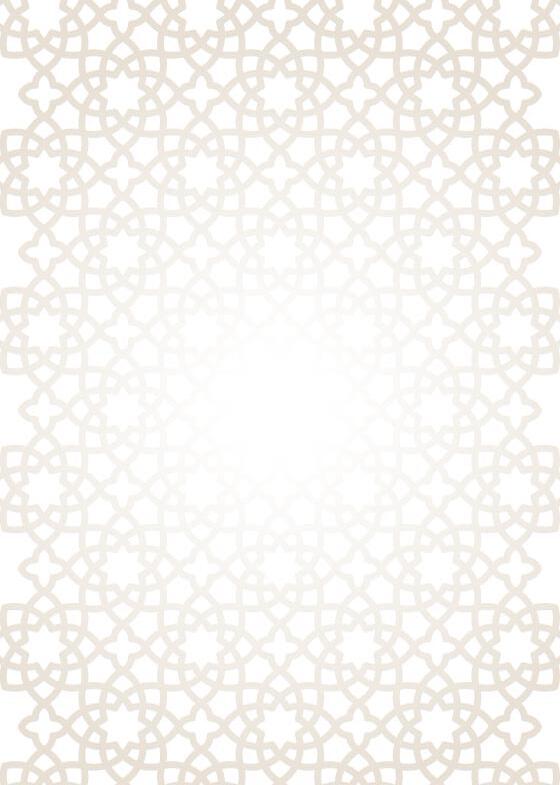
Hazooraba said that a person who gave precedence to their faith would naturally be inclined to lead a moral life and instil within themselves the values that Islam advocated.
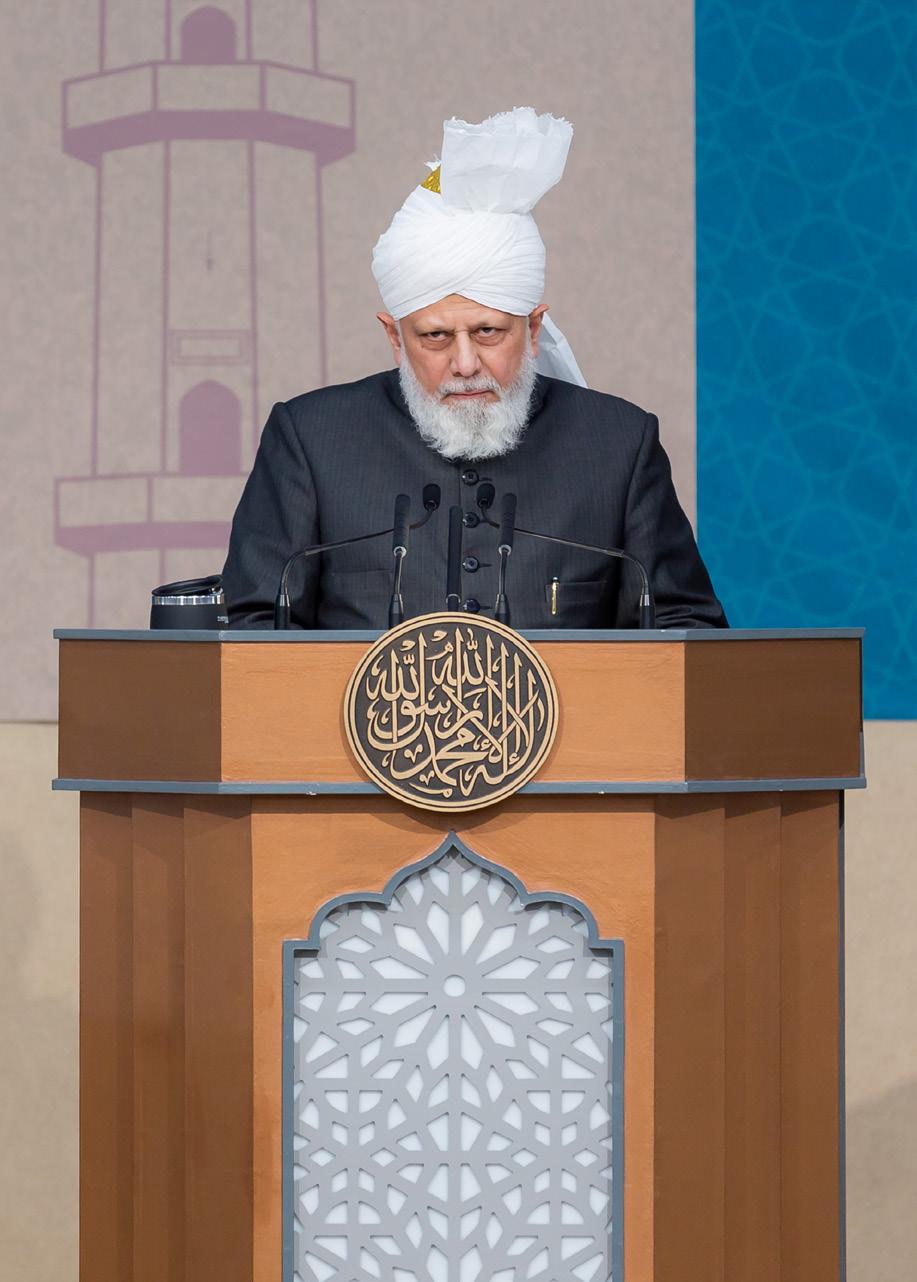
While the world continues to be Godless, it becomes incumbent on the Waaqifaat-e-Nau to prove themselves to be true servants of God’s religion and for this, one must recognise their true status and values.
Waaqifaat-e-Nau are girls who can and should bring about a moral and spiritual revolution in the world, just as our lord and master, the Holy Prophet, peace and blessings of Allah be upon him, brought about a revolution.
The Holy Prophetsaw had said that when the Muslims would experience spiritual malaise, at such a time a Messiah would appear who would revive faith and bring people back to their Creator. The Promised Messiahas called Muslims and non-Muslims alike to the true religion, Islam, and as his servants, having dedicated their lives for the service of their religion, Waaqifaat-e-Nau had an even greater responsibility than other Ahmadi Muslims to be examples and living models of the true Islamic teachings. They ought to strive to establish God’s teachings in this world so as to encourage others to follow suit.
“Through your words and especially your deeds, you must educate and inspire others towards the fact that as human eings we must fulfl each other s rights and live in peace and harmony. You must guide others about the importance of upholding human values and treating one another with love and indness and respect. owever you cannot e pect to in uence others until you yourselves are acting upon Islam s teachings.
“In this regard the foremost duty of a uslim is to worship llah as e desires. ccordingly as mem ers of the Waaqifaat-e-Nau scheme you must always protect and safeguard your prayers. onsider salat to e your constant companion.
18 | Maryam
“It should not be that you delay or miss prayers because of your worldly affairs or education. Do not be lazy or fall prey to weak excuses that take you away from Allah’s worship; rather, ensure that you offer Salat on time and with deep care and concentration.
“Occasionally, due to bad weather or other genuine reasons, Zuhr and Asr or Maghrib and Isha can be combined, but even then, they should be offered at the earliest possible time. Furthermore, a Muslim should recite and ponder over the Holy Qur’an each day and strive to act upon its teachings.
“ s Waaqifaat-e-Nau, you have pledged your lives for the service of your faith and so it is especially incumbent upon you to study the Qur’an and identify its various teachings. Every command of the Qur’an is vitally important and must not be taken lightly.”
Hazooraba then said that the Holy Qur’an reminded us of our many duties, for example in respect to parents and our duties towards them, purdah and guarding one’s modesty from men and wearing the hijab
“It is true that in the non uslim world the concept of purdah and hijab has long een criticised. Yet now, certain non-Muslims are actually calling for safeguards that mirror Islam’s teachings. They are coming to realise the need for caution following reports of countless cases of men harassing and abusing women at all levels of society.
“Relatively recently, a survey found that 97% of women aged between the ages of 18-24 in the UK had been harassed by men. Across all age ranges, 70% of women said they had faced sexual harassment in public. As a result, there have been calls to establish safe spaces for women or to have women-only events.
“Similarly, recently a new report found that many women and girls in the UK were leaving sports and exercise because they felt uncomfortable as though they were being sexualised by being forced to wear sports kits that exposed much of their bodies.
“Thus, you should never harbour any form of inferiority complex or embarrassment regarding hijab or any other of Islam s teachings. Instead you should feel pride in your religious beliefs and be confident in the expression of your faith. Certainly, there is no Islamic injunction or restriction that is without reason or logic. Each Islamic teaching is based upon human nature and the means for ensuring societal peace and harmony.”
Hazooraba said that immodesty was rife in society, whether it was on television, social media or outside in parks and beaches etc. Every Waqifa-e-Nau girl must show a strong character and “seek to embody Islam’s teachings in all respects”.
Another aspect of Islam’s teachings Hazooraba wished to highlight was speaking the truth. Even when joking, one should not be deceptive or lie.
“Furthermore, Islam teaches that a person should treat his relatives with love and affection and Waaqifaat-e-Zindagis and Waaqifaat-e-Nau should try to manifest this quality even more than others.
“With the grace of Allah, the Waqf-e-Nau scheme has reached a stage where many of
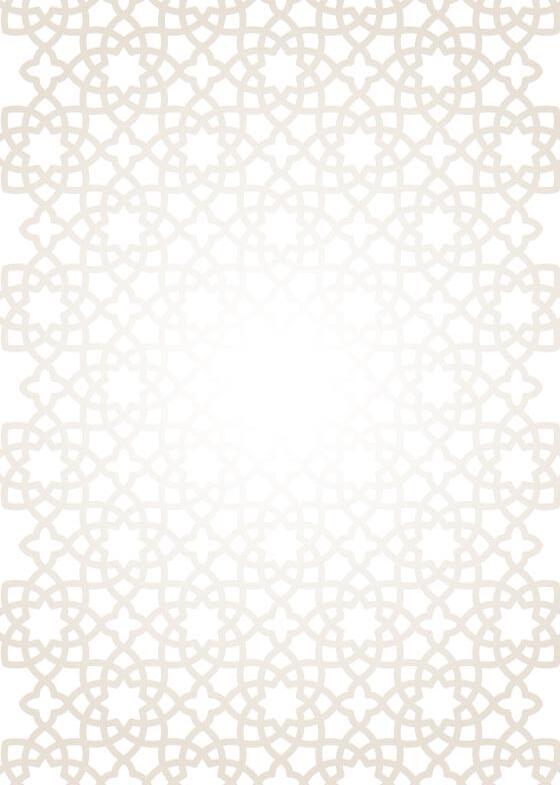
Maryam | 19
the early Waaqifaat-e-Nau girls are now mothers. Indeed even many of those orn some years later are now married and starting their families. he responsi ilities of such Waaqifaat-e-Nau are much increased. here efore they had to concentrate primarily on their own moral state now they are also directly responsi le for the training of the ne t generation of the ama at. o fulfl this duty hmadi mothers must manifest the highest standards of worship of llah and inculcate within themselves the very est morals.
“ ost of you have een rought up and educated here and so you understand this society and recognise its ills and vices. tilise this nowledge to not only save yourselves from its ill effects ut also to guide your children so that they avoid the moral pitfalls and traps that await them as they grow and develop.
“ ithout a shadow of a dou t it is a great challenge of the time for hmadi mothers to ensure that our future generations remain attached to their religion. oreover e ever mindful of your duty to ring people towards od.
Hazooraba then said: “ very Waqifa-e-Nau must start with their own home. reat your younger si lings and children with love and care and strive to nurture a love of llah within their hearts. hereafter reach out to your neigh ours friends and the wider world. ever waver in your efforts to develop a righteous society in which the teachings of llah the lmighty reign supreme. e ready for every sacrifice for the sa e of your faith and ta e inspiration from those no le women from the past who attained the highest spiritual ran s.
In every age, righteous women had played a massive role for the sake of their faith and belief in Allah. Hazooraba gave the example of the female disciples of Jesusas who excelled in their faith and showed immense courage for their belief. It was Mary Magdalene and two other women who came to the help of Jesusas when he spent three days in a tomb-like cave following his deliverance from the cross.
he Holy ur an s ecifcally mentions two very pious women – Hazrat Maryamas and the wife of the Pharoah. In the case of the latter, “she remained faithful to Allah even though she was the wife of a disbeliever”.
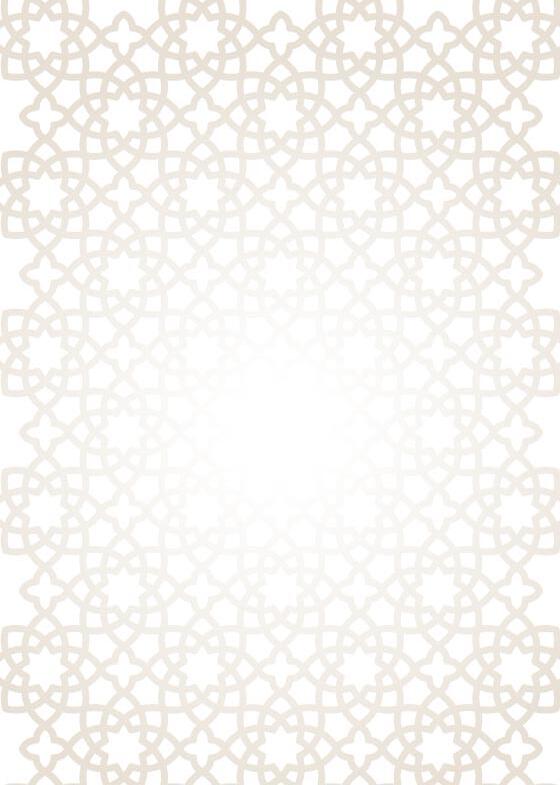
During the blessed era of the Holy Prophetsaw, the sacrifces of women reached new heights and shall forever remain examples for times to come. They bore untold grief and suffering for the sake of their faith. Hazooraba then outlined how cruel treatment was meted out to the early Muslims.

20 | Maryam
“Once the Holy Prophetsaw o served a uslim hus and and wife oth of whom were slaves eing horrifically tortured in this way y their merciless master. hey were forced to lie in the listering heat upon oiling sands and were relentlessly eaten and hard stones were placed upon them all the while their owner demanded they renounce their elief in the oly Prophetsaw. espite their agony they never once wavered in their faith.
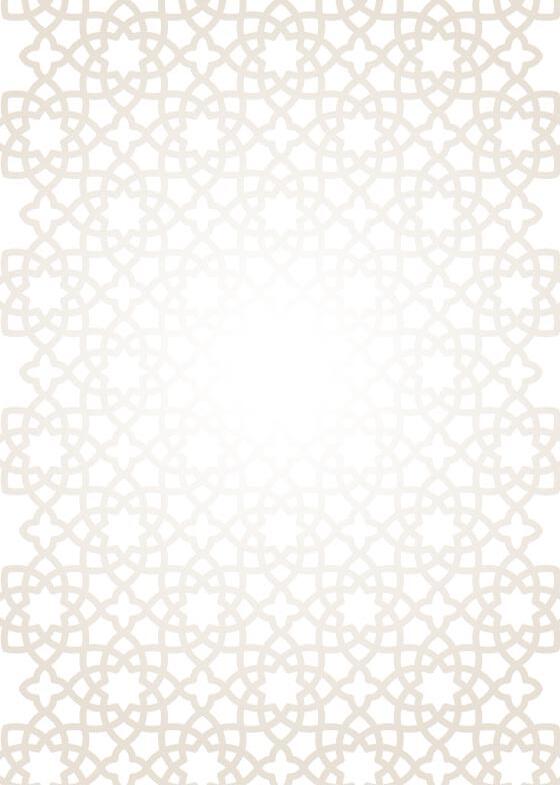
“ pon o serving their torment the oly rophetsaw ecame overwhelmed with emotion and grief and turned to llah in prayer. he oly Prophetsaw addressed the uslim hus and and wife and consoled them to remain patient and gave them the glad tiding that they would receive the greatest of llah s reward and ounty soon.
“ ltimately as a result of the incessant torture the hus and lost his life. t that moment when the uslim lady had lost her hus and her owner still failed to show any mercy. Instead he too a spear and violently pierced open her stomach causing her death.
“In worldly terms that woman had no ran or status. Indeed as a slave she was part of the wea est class of society and considered no more than a chattel or property of their owner. Yet due to her a solute conviction in the truth of the oly Prophetsaw and her impecca le standards of faith that lady who the world loo ed down upon scaled the highest spiritual pea s and her no le status has een etched indeli ly in history forevermore.
“ nother awe inspiring e ample from early Islam is that of a rat mm e mmarara who demonstrated outstanding ravery and steadfastness far eyond many uslim men during various attles in the early period of Islam.
“ i ewise we have efore us the e traordinary e ample of a rat mar s sister who tolerated the wrath of her enraged rother in order to ensure that the sanctity and dignity of the oly ur an was preserved. eeing his sister s supreme level of faith moved a rat marra and proved a watershed moment in his life leading him to accept Islam.
“ oving forward to this era with the grace of llah many hmadi women have also rendered great sacrifces for the sa e of their faith.
“In a istan it is not only hmadi men who have em raced martyrdom. hmadi women have also given their lives for the sa e of their faith. ith unwavering courage they remained frm in their faith till their last reath and never yielded to the rutalities and cruelties they were su ected to. In reality history is replete with the magnifcent role uslim women have played for the sa e of their faith and they serve as role models for all those Waaqifaat-e-Nau who have pledged in this era to give precedence to their faith over all worldly matters.
“ lways remem er that such stories are not ust for us to read a out or to consign to the history oo s rather they ought to inspire us to remain frm in our faiths and navigate the challenges of modern society. ccordingly every hmadi lady and girl especially mem ers of the Waaqifaat-e-Nau scheme must understand that now it is their turn to ta e up the mantle of eing ready for every possi le sacrifice for the sa e of their faith.
Maryam | 21
“There are countless moral ills and vices prevalent in today’s society and increasingly, people are a andoning religion. nder such circumstances Waaqifaat-e-Nau must take a stand for the sake of Allah the Almighty. You must strive to eradicate all traces of worldliness from your minds and ensure that you do not fall prey to the superficial attractions and glamour of the world. Instead, seek to live your lives according to Islam’s teachings.
“Be ever willing by giving precedence to your religious convictions. Guard your faith and seek to establish an everlasting living bond with Allah; bow before Him in all humility and sincerely pray that you can effect a profound change in the world through Tabligh and your righteous conduct. trive every day to play your role in uniting mankind under the banner of the Holy Prophetsaw so that the people of the world join together as one in prostration before Allah the Almighty. If you rise to this challenge, you will fulfil the objective of your life and be able to claim that you are Waaqifaat-e-Nau, not just in name but far more importantly in spirit and deed.
“ hether young or old I reiterate that you must always see to fulfl the righteous pledge made y your parents efore your irth which you later affrmed of giving precedence to your faith over worldly matters and spending your lives in the service of Islam.
“ ay llah the lmighty grant you all the a ility to do so. ay you all fulfl your duties and e amongst those who ring a out a true and everlasting revolution in the world. Amin.”
Thereafter, Hazooraba led everyone in silent prayer before departing at around 17:51 BST.
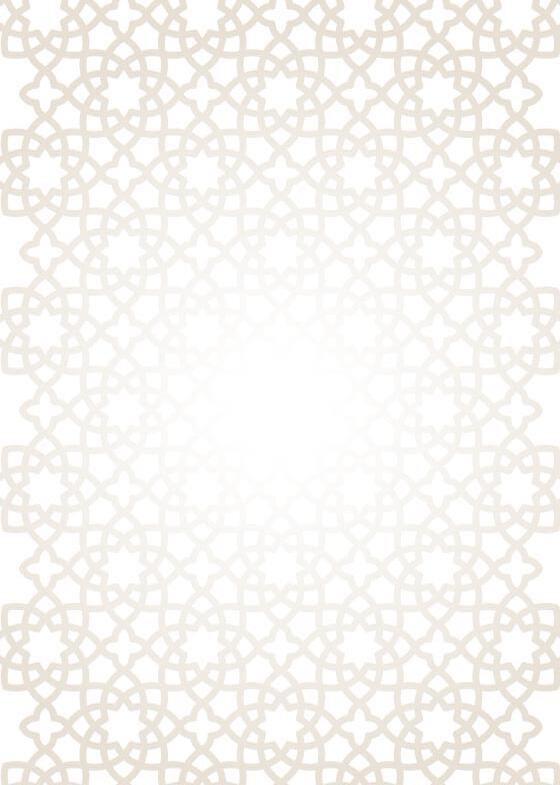 Prepared by Al Hakam https://www.alhakam.org/waqifaat-e-nau-uk-ijtema-2023/
Prepared by Al Hakam https://www.alhakam.org/waqifaat-e-nau-uk-ijtema-2023/

22 | Maryam
Tarbiyyat Page
Presented below are some questions and answers from various classes with Hazrat Mirza Masroor Ahmad, Khalifatul Masih Vaba.
A Waqifa-e-Nau said that Suf theology claimed to promote nearness to Allah through their spiritual practices. She asked if there were any benefts to such practices and customs that promoted gaining nearness to Allah.

Hazooraba said:
“There was no Sufsm during the time of the Holy Prophetsaw. Was there any Suf at that time? No. There was no Suf during the time of the four rightly-guided Khulafa-eRashideen. After centuries, this thing started and when it started it was because at that time the Khilafat was not the spiritual Khilafat. It was a worldly Khilafat. And the Khulafa of those times were after worldly gains. And the Khalifa was not the chosen Khalifa by the community, but they inherited it. This is why, at that time, there was a group of people who stood up and said ‘We are the spiritual people and we tell the people what is the actual spirit of your religion, what is the spirit of prayers, and how you should pray, how you should bow before Allah, how you should practise the commandments given in the Holy Qur’an’, and this is how they started and how they started explaining diferent ways of teachings of the Holy Qur’an and this is how it all developed.
“But, now, after the coming of the Promised Messiahas who came to revive the religion of Islam, according to the prophecy of the Holy Prophetsaw of Islam there is no need for any Suf, nor to follow any Suf.
“Even, I remember once I explained in my khutbah [sermon] the following verse:
[Allah is the Light of the heavens and the earth. (Surah an-Nur, Ch.24: V.36)]
One of the Arab persons, who had newly converted to Ahmadiyyat, said, ‘I was a follower of Sufsm. And now after having listened to your khutbah, I can see there is no bigger Suf than the Promised Messiahas, and how he has explained the Holy Qur’an. [Considering] how he has explained the teachings of the Holy Qur’an, we don’t need any Suf now.’
“And now the Khilafat is also rightly guided, as long as it will remain as it is, there is no need of Sufsm. So, it was the requirement of the past, not the present.” 1
(5 October 2022, Waaqifaat-e-Nau Class, Texas, USA)
ضر او تومسلا رون ہللا
Maryam | 23
An attendee asked Hazooraba why the frst chapter of the Holy Qur’an, Surah Al-Fatiha, has several names.
Hazooraba replied:
“Because this is the chapter which contains the gist and the summary of the whole of the Holy Qur’an. This is why it has diferent names and this is the basic Surah that asks you to praise Allah the Almighty and to seek His Refuge. Then it also has so many other Attributes of Allah the Almighty which it contains. [Surah Al-Fatiha is called], ‘the Cure’ because it gives health to your spiritual diseases. You recite Surah in Al-Fatiha, ‘All praise belongs to Allah, who is the Lord of the world, He is the Provider and Sustainer of everything and He is Merciful and Ever Gracious’, and…there are so many other things written in it. So, it has been given the [various] names because it is the Surah which contains all the subject matters which are given in detail in the other parts of the Holy Qur’an.”2
(27 November 2022, Virtual Class with Nasirat from Ghana)
A member of Nasirat-ul-Ahmadiyya asked why there was a division in Islam after the demise of the Holy Prophetsaw .
Hazooraba said:
“It was not immediately after the demise of the Holy Prophetsaw. There was a Khilafate-Rashidah [Rightly Guided Khilafat] for 30 years and during the time of Hazrat Usman the rift started between Muslims and it was because of the hypocrites of that time who did not want Islam to fourish. It was also prophesied by the Holy Prophetsaw that, “after my demise, there will be a true Khilafat – that is Khilafat-e-Rashidah –for some years, and then there will be a rift and division among Muslims.” There is a narration of the Holy Prophetsaw that then there will be a rift for a longer period, for almost a thousand years. And after that, the Promised Messiahas will come and he will again try to unite the Muslims. So, this is what we Ahmadi Muslims have been doing, that we are trying to unite the Muslims, and this is the prophecy of the Holy Prophetsaw that after the demise of the Promised Messiahas, the institution of Khilafat will start and that is what we are saying, that now there is no Khilafat among other Muslims, only among Ahmadi Muslims there is a Khilafat and people are coming to join us day by day. Every year hundreds of thousands of people come to join the Ahmadiyya Muslim Community. So, this is how we are increasing and others are decreasing.”
Hazooraba further said:
“So, this was the prophecy of the Holy Prophetsaw that whenever there will be some worldly desire among Muslims, there will be a division, and that is what we saw. There were kings after the thirty years of Khilafat-e-Rashidah. Although it is called ‘Khilafat,’ it was not [true] Khilafat. It was a sort of kingship. So, there were kings and the Khilafat was inherited Khilafat, whereas there is no concept of inherited

24 | Maryam
Khilafat in Islam. But now, since you have accepted the Ahmadiyya Muslim Community, you have joined the Community of the Promised Messiahas and you are the person who has fulflled the prophecy of the Holy Prophetsaw. You have accepted the desire of the Holy Prophetsaw. So, you are a lucky person.”3
(27 November 2022, Virtual Class with Nasirat from Ghana)
A Waqfe Nau asked what supplications Ahmadis should offer when praying for the Khalifa-e-Waqt.
Hazooraba said:
“You should pray that Allah the Almighty helps the Khalifa of the time to discharge his duties – that the burden of the duties Allah has put on the shoulder of the Khalifa-e-Waqt is properly discharged. So, Allah gives him strength and health so that he works properly for the cause of Islam and Ahmadiyyat.
“And whatever the plans are in the mind of the Khalifa of the time, they are completed with Allah’s help in the shortest possible time and in the best way. And Allah the Almighty may also give him the helpers – that is Sultan-e-Naseer – so that a team of helpers can also help the Khalifa-e-Waqt. And Allah may also make us the helpers of the Khalifa of the time, so that, as waqifeen-e-nau, we also discharge our duties to help the Khalifa-e-Waqt in completing his assignments, tasks, wishes and plans.”4

(5 October 2022, Waqe Nau Class, Texas, USA)
1 https://www.alhakam.org/muslim-youth-ask-the-khalifa-responds-usa-tour-2022/
2 https://www.pressahmadiyya.com/press-releases/2022/12/nasirat-from-ghana-have-honour-of-virtual-meeting-with-world-head-of-ahmadiyya-muslim-community/
3 https://www.pressahmadiyya.com/press-releases/2022/12/nasirat-from-ghana-have-honour-of-virtual-meeting-with-world-head-of-ahmadiyya-muslim-community/
4 https://www.alhakam.org/muslim-youth-ask-the-khalifa-responds-usa-tour-2022/
Maryam | 25
English Translation of a couplet by the Promised Messiahas, Precious Pearls, p.69
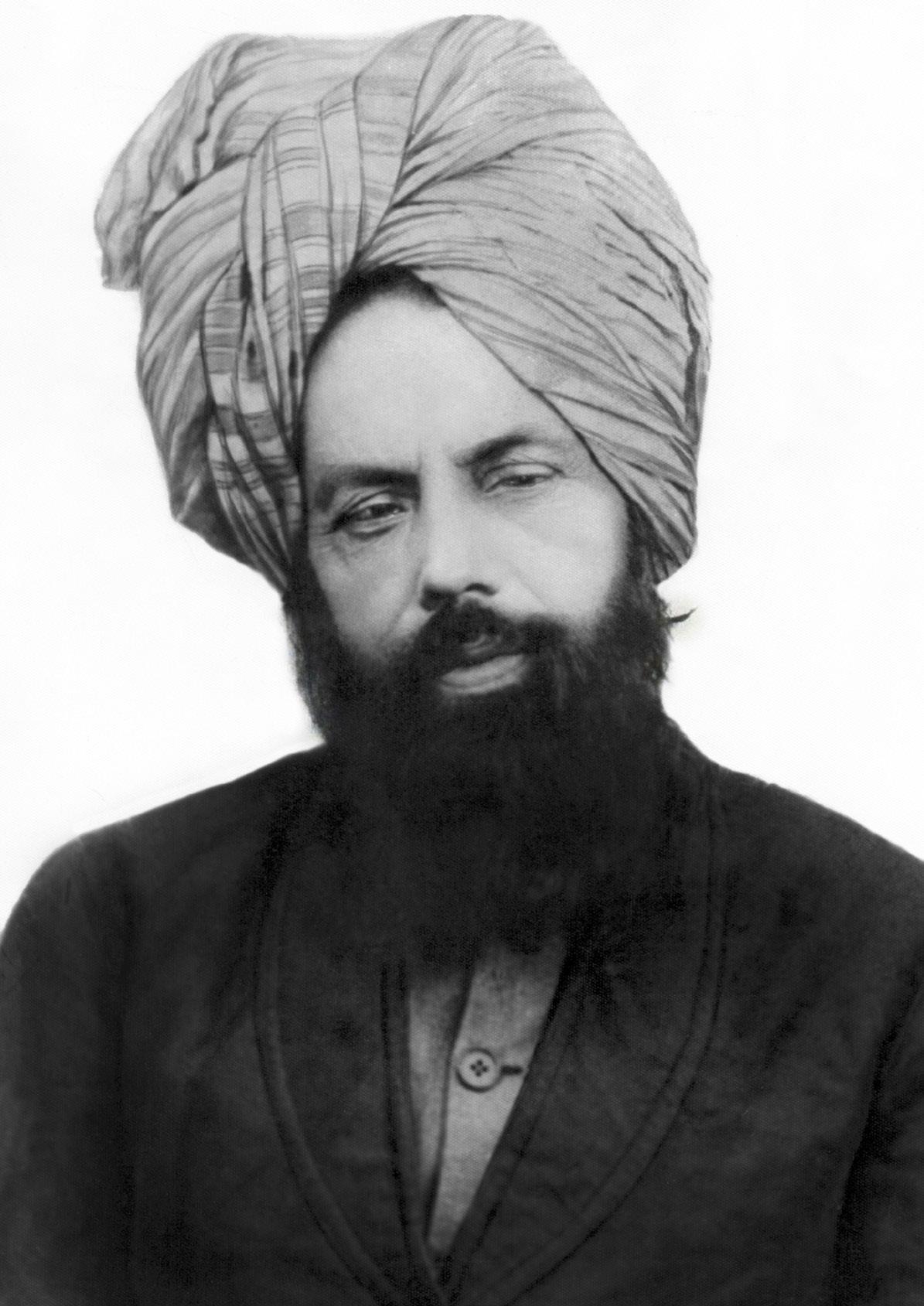
“ It is constantly in my heart to kiss Thy Scriptures –And to go around the Qur’an –this surely is my Ka‘bah.”
26 | Maryam
Hazrat

The Qur’an is my sustenance and is the source of my soul’s refreshment.
I read it a number of times a day, but my soul never has its ll. It is healing, it is mercy, it is light, it is guidance.
Hazrat Hakeem Maulvi Noor-ud-Deen Sahib, Khalifatul Masih Ira
“ ” Maryam | 27
Maulvi Noor-ud-Deen ra Khalifatul Masih I by Muhammad Zafrulla Khanra p. 103-104 https://www.alislam.org/library/books/HazratMaulviNooruddeen.pdf

28 | Maryam
“I was a person who possessed no secular knowledge, yet God of His Grace, appointed angels for my instruction and by this means made me aware of such meanings of the Qur’an as were beyond the imagination of a human being. The knowledge that God has bestowed upon me and the spiritual fountain that has burst in my bosom are not mere guess or imagination. Indeed, they are so certain and conclusive that I challenge the whole world that I am prepared to compete at any

Fazl-e-Umar, p.293-294
https://www.alislam.org/library/books/Fazl-e-Umar.pdf
time with anyone who might claim that he has been taught the Holy Qur’an by God Almighty.”
Hazrat Mirza Bashir-ud-Deen Mahmood Ahmad, Khalifatul Masih IIra
Maryam | 29

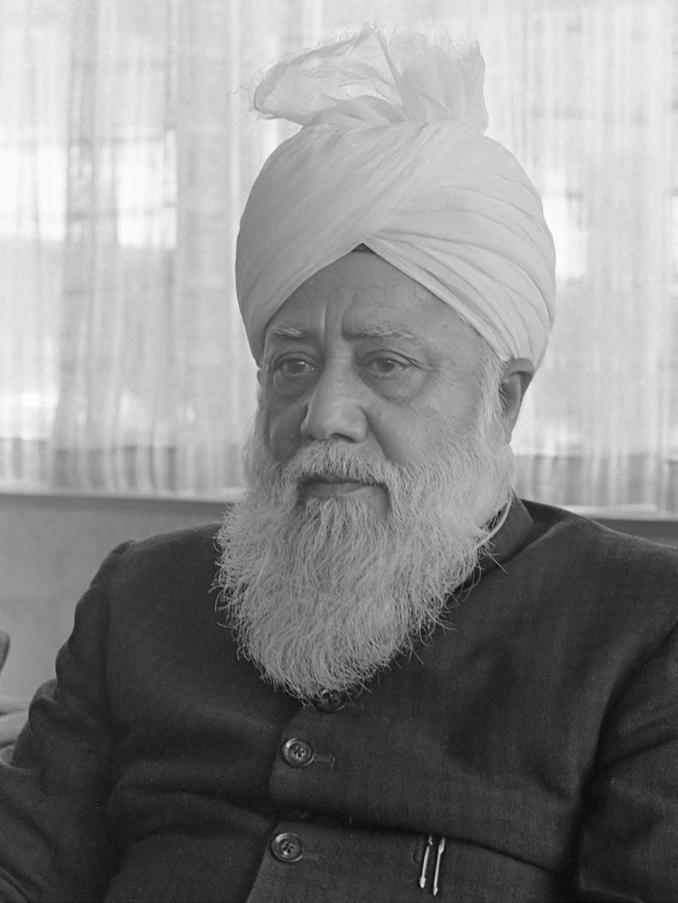
Hazrat Mirza Nasir Ahmad, Khalifatul Masih IIIrh, Twenty-three Great Objectives of Building the House of Allah, p.39 https://www.alislam.org/library/books/23-Great-Objectives-House-of-Allah.pdf
30 | Maryam
“According to one connotation of the word بیر (doubt) the Holy Qur’an is the only perfect book which can meet the spiritual, physical, social, moral, economic and political needs of humankind; and it is the only perfect book which ful ls all the genuine requirements of human nature, because this book proves its need and veracity by virtue of its intrinsic excellence and eminence and unparalleled teachings.”
Those who recite the Holy Qur’an with comprehension, with their hearts melting at the message of the verses being recited and lled with the love of Allah, have the true spirit of recitation. In the homes of Waqifeen-e-Nau this aspect of recitation should be stressed upon.
Hazrat Mirza Tahir Ahmad, Khalifatul Masih IVrh, Sermons on Waqf-e-Nau, p35 https://www.alislam.org/library/books/Sermons-on-Waqf-e-Nau.pdf


“
“
Maryam | 31


32 | Maryam
Holy Qur’an guides the natural human qualities aright. The Holy Qur’an draws out and elaborates on the true nature, which people are moving further away from, especially today. It is because they are moving away from this, that in today’s day and age, we see a tendency towards creating laws that are immoral and unnatural. People are trying to pervert [human nature]. Allah the Almighty states that, by pondering and acting upon the Qur’an, it enables one to achieve the highest level of human nature. Hence, it is important to ponder over it and we should read and understand the Holy Qur’an from this lens. This way, we can also remain safeguarded against the poison that is being fed into the minds of young and old under the pretence of freedom.”
Friday Sermon, March 31 2023
https://www.alislam.org/friday-sermon/2023-03-31.html

“The
Hazrat Mirza Masroor Ahmad, Khalifatul Masih Vaba
Maryam | 33
?
Kids’ Spread - The Holy Qur’an DidYOU KNOW
1.The Holy Qur’an is divided into 114 Surahs or chapters
2.There are in total 6,348 verses in the Holy Qur’an
3.Surah Al Baqarah is the longest chapter with 287 verses
4.Surah Al Kauthar is the shortest with only 4 verses
5.The text of the Holy Qur’an has remained unchanged over the past 1400 years
6. The Qur’an was revealed by Allah to the Holy Prophet Muhammadsaw over a period of about 23 years
7.The revelations were conveyed to the Holy Prophetsaw by the angel Gabriel who made the Prophetsaw recite the revealed verses in his presence
8.Muslims must always begin the reading of the Holy Book with a short prayer: ‘I seek refuge with Allah from Satan, the rejected’
9.Finger print technology, genetic engineering, pollution, zoos, modern transport systems, modern communication systems and extra-terrestrial life forms are some of the prophecies that have been fulfilled
10.The contents of the Holy Qur’an covers 5 main themes: Nature of the Spiritual World, The Law and Commandments, Historical Accounts, The Wisdom and The Prophecies
Sources:
https://www.alislam.org/articles/fulfilled-prophecies-of-holy-Qur’an/ https://www.alislam.org/articles/about-holy-Qur’an/
? ? ? ? ? ? ? ? ? 34 | Maryam
Besides its proper name, the Qur’an is also known by many other names. Can you match the names of the Holy Qur’an on the left to their meaning on the right.
Al Tanzil
Al Haqq
Al Rahmat
Al Furqan
Al Dhikr
Al Bayan
Al Burhan
Al Noor
Al Kitab
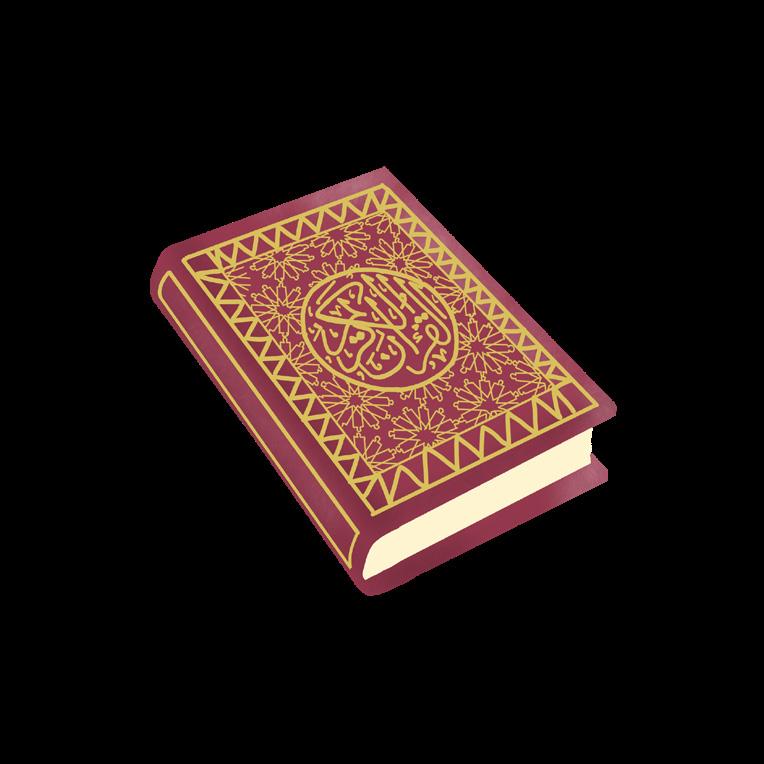
Al Hikmat
Al Huda
Al Mua’izah
Al Hukm
Al Rooh
The Book
The Judgement
The Light
The Truth
The Mercy
The Guide
The Word
The Discrimination
The Wisdom
The Explanation
The Exposition
The Argument
The Revelation
The Admonition
Maryam | 35
Quiz
1.What is the meaning of the word “Qur’an”?
2. Where was the Qur’an revealed first?
3.What was the age of Prophet Muhammedsaw when the Qur’an was first revealed to him?
4. Where was the first Surah revealed?
5.Where was the last Surah revealed?
6.From which Surah the first verses of the Qur’an were revealed?
7.Which chapter of the Qur’an is to be read compulsorily in each raka’at of Namaz (Prayer)?
8.How many Para (parts) are there in the Qur’an?
9.How many Surahs (chapters) are there in the Qur’an?
10.How many Ruku (paragraphs) are there in the Qur’an?
11.Which is the Surah (Chapter) that does not start with Bismillah?
12.In which Surah (Chapter) of the Qur’an is Bismillah repeated twice?
13. How many Surahs (Chapters) in the Qur’an have the titles named after different Prophets?
14. What is the term used by Muslims for people who have completely memorised the Holy Qur’an?
36 | Maryam
Answer Page
Names of the Holy Qur’an section:
Al Kitab - The Book
Al Furqan - The Discrimination
Al Dhikr - The Exposition
Al Bayan - The Explanation
Al Burhan - The Argument
Al Haqq - The Truth
Al Tanzil - The Revelation
Al Hikmat - The Wisdom
Al Huda - The Guide
Al Hukm - The Judgment
Al Mau’izah - The Admonition
Al Rahmat - The Mercy
Al-Noor - The Light
Al-Rooh - The Word
Quiz:
1.That which is read often
2.In the cave of Hira
3.40 Years
4.In Mecca
5.In Madinah
6.Surah Al ‘Alaq
7.Surah Al-Fatihah
8.30 parts
9.114 chapters
10.540 paragraphs
11.Surah At-Tawbah
12.Surah An-Naml
13.6 Surahs: Surah Yunus, Surah Hud, Surah Yusuf, Surah Ibrahim, Surah Nuh, Surah Muhammad
14.Hafiz
Maryam | 37
The First Custodian of the Holy Qur’an
 By Ayesha Mahmood Malik
By Ayesha Mahmood Malik
38 | Maryam
With the holy month of Ramadan upon us once again, Muslims the world over will be turning their time and attention into pouring over the contents of their Holy Book, The Qur’an. Since the Qur’an was revealed during the month of Ramadan, a full and complete reading of the same is deemed highly desirable during the 30 days of fasting, and today Muslims can do this not just by physically opening the Qur’an but by reading and listening to it on their tablets and smartphones.
Yet this idea of a ‘soft copy’ of the Holy Qur’an is far removed from its earliest versions that were carved onto stones or pieces of parchment. The Qur’anic verses were committed to memory as they were revealed, and many companions of the Holy Prophetsaw had learnt the entire Qur’an by heart. During the Battle of Yamama which was fought in December 632, dozens of huffaz (people who have committed the Qur’an to memory) lost their lives. This led Hazrat Umarra to suggest to Hazrat Abu Bakrra, the caliph at the time, to initiate the process of compiling the Qur’an into written form.
Thus, while a full-scale distribution of the Holy Qur’an did not occur until the time of Hazrat Uthmanra, the process of putting it together into a single book began with Hazrat Abu Bakrra who asked Hazrat Zaid bin Thabitra to undertake the task. However, there is a little-known and little-mentioned but historically striking fact in the process of compiling this very frst version of the Qur’an – viz, that when its pages had been put together as one book, it was handed over for safekeeping to a woman.
That woman was Hazrat Hafsa bint ibn Umar al-Khattab – the frst custodian of the Holy Qur’an. Hazrat Hafsara was the daughter of the second Rightly Guided Caliph, Hazrat Umar ibn al-Khattabra and unlike what was customary at the time, she learnt to read and write at an early age. The family of Hazrat Umarra was renowned for education and learning and Hazrat Hafsara was no exception, she memorised the entire Qur’an and 60 Ahadith (sayings of the Holy Prophetsaw) have been quoted by her.
Maryam | 39
“...there is a littleknown and littlementioned but historically striking fact in the process of compiling this very first version of the Qur’an – viz, that when its pages had been put together as one book, it was handed over for safekeeping to a woman.”
Hazrat Hafsara also holds the distinction of being one of the wives of the Holy Prophetsaw. She was frst married to Hazrat Khunais bin Huzaifara, a companion of the Holy Prophetsaw who was severely injured during the Battle of Badr, later succumbing to his injuries. Like her father, she was inquisitive and sharp-witted and was known for undertaking a deep comprehension and scrutiny of Qur’anic injunctions. This thirst for knowledge accompanied by her curious nature meant that she would often engage in intellectual discourse with the Holy Prophetsaw as a means of enhancing her insight and wisdom.
Her intellectual prowess together with her exemplary piety meant that even as verses of the Holy Qur’an were written down on pieces of parchment during the lifetime of the Holy Prophetsaw, he would entrust these to Hazrat Hafsara for safekeeping. Towards the end of his caliphate, Hazrat Umarra bequeathed the compiled copy of the Holy Qur’an to his daughter, which remained with her until her demise. It was Hazrat Hafsa’sra copy that was used during the caliphate of Hazrat Uthmanra for the widescale printing and dissemination of the Qur’an.
Courtesy of The Review of Religions https://www.reviewofreligions.org/42124/the-frst-copy-of-the-quran-and-its-little-known-safe-keeper/ 40 | Maryam
Therefore, in Hazrat Hafsara is an enduring but scarcely known legacy – the first custodian of the Holy Qur’an – a legacy that deserves to be recorded frequently in the pages of history and particularly during the month in which the Qur’an was first revealed

Maryam | 41
National Waaqifaat-e-Nau Ijtema 2023
 By Laiqa Bhatti
By Laiqa Bhatti
On 29th April 2023, Waaqifaate-Nau UK held their annual Ijtema, 4 years after their last one in the Baitul Futuh Mosque Complex, Morden. Hazrat Khalifatul Masih Vaba graced the Ijtema with his presence and formally concluded the event with a magnifcent and most inspiring address. The ijtema commenced at 9:30am, with registration and breakfast. Following the opening session chaired by respected Sadr Sahiba UK, Waaqifaat-e-Nau were split into their respective age groups: 7-9, 10-12, 13-15, 16-20, 21+ to partake in the various workshops focusing on group discussions as per beloved Hazoor’saba instructions for the ijtema.
Splitting the Waaqifaat-e-Nau into 5 age groups meant that each workshop was tailored to their understanding, purpose and journey of their waqf and dedication to Khilafat, as well as tackling contemporary issues and potential challenges arising in their current stages of life, be that school, university, work, within their families or homes.
Workshops included ‘how to fulfl our roles as Waaqifaat-e-Nau’, ‘understanding how Islam champions the rights of women’, ‘tackling contemporary issues faced by our youth’ and ‘the importance of developing a strong attachment to Khilafat’.
For the older Waaqifaat-e-Nau, additional workshops were arranged for career’s guidance, tabligh based workshops with a practical session on how to write letters to newspaper editors.

42 | Maryam
Waaqifaat-e-Nau Nasirat

Our youngest girls began their day with their frst presentation on how they can fulfl their waqf. The girls spoke and discussed how their journey of waqf began and how they can nurture and grow it. To remind them of the beauty of taking care of their ‘seed of waqf’, the girls planted some beautiful fower seeds into pots to symbolise their waqf. Many of the plants have sprouted and we can’t wait to see all the beautiful fowers the girls will InshaAllah grow.
For the workshop on how to fulfl their waqf for our 10-12 year olds Waaqifaat-e-Nau were split into smaller groups. Each group was given a different challenge relating to their education and schools, and the opportunity to discuss with their teams what should be done in each scenario, sharing their own experiences along the way. As the theme was ‘education’, this workshop concluded with a presentation on Dr Abdus Salaam, a great devotee of Islam Ahmadiyya, and a stellar inspiration in the feld of education. Receiving the greatest accolade of his time, the Nobel Prize, Dr Abdus Salaam set a great example for all Waaqifaat-e-Nau in the standard they should be aiming to achieve.
For their next workshop, our 7-9 and 1012 year old aged Waaqifaat-e-Nau girls
had the opportunity to watch selected short questions raised to Beloved Hazooraba by fellow children and listen to the most profound responses. The questions included what children should do to become nearer to Allah, and what is the best way to express love for Khilafat, to what our daily routine should be. The girls also had the opportunity to listen to other Waaqifaate-Nau’s stories of their prayers being accepted, faith strengthening experiences of the existence of God and their invaluable frst-hand experiences with Khilafat.

The 13-15 year old Waaqifaat-e-Nau also discussed in smaller groups how to fulfl their Waqf in light of their education as well as in light of their purdah, be that their outward or inner purdah. In another session, the Waaqifaat-e-Nau spoke about the signifcance of choosing the right career as a Waqf and how to go about it

Maryam | 43
when making subject choices. Different presenters spoke to smaller groups about specifc careers suited to Waaqifaat-e-Nau. As Waaqifaat-e-Nau, our sole purpose is to serve God Almighty, ultimately through service of the Jama’at and obedience to Khilafat. Therefore, the careers we choose should be one that serves humanity and any choice must involve the guidance of Khilafat.
Waaqifaat-e-Nau of this age group also had workshops on common allegations made against Islam Ahmadiyyat and the Promised Messiahas and how to answer them. Once again, girls had the opportunity to discuss within their smaller groups on how they could answer set allegations and with what proof, before presenting to the rest of the large group. Following on from that, there was another workshop relating to women and their Identity in Islam. It tackled many false statements often made about women in Islam, including the allegation of women not being equal in Islam and their sole role pertaining to taking care of their husbands and children without any thought given to further education or careers.
All Nasirat girls also had an opportunity to check out the activity zone, which was flled with fun activities including games such as tug of war, foosball and ball maze, arts & crafts corner as well as interactive science experiments!
Waaqifaat-e-Nau Lajna

For the older girls, the aim of the day was to start conversations and spark questions with regards to their waqf as they enter new facets of life including careers, marriage and motherhood and how to balance them with their lifetime commitment of waqf. Alongside presentations on contemporary issues, fulflling waqf abroad, there was a panel discussion which included Waaqifaat-e-Nau of different walks of life.
The audience had the opportunity to see real life examples on how other fellow Waaqifaate-Nau balanced their waqf alongside other roles in life, the challenges they faced and how they overcame them.

The 16-20 and 21+ year old group’s workshop on ‘how to fulfl their waqf’ focused on the ‘Jihad of the Pen’. The purpose of the workshop was to demonstrate to the Waaqifaat-eNau how they can partake in defending Islam in the era of press and social media. Split into two parts, the frst part consisted of a presentation demonstrating how to write to editors of newspapers, especially in response to wrong allegations made against Islam by the press. Equipped with the practical examples, the Waaqifaat-e-Nau were given the opportunity to formulate as well as respond to a selected article from a newspaper.
The 16-20 year old Waaqifaat-e-Nau then split up for their workshop on ‘Identity’, in which they broke down the term ‘feminism’ in light of Beloved Hazoor’saba speeches in which Beloved Hazooraba has highlighted the rights of women. They also further explored women’s rights compared to men’s, the importance of applying equity in matters concerning women’s rights versus equality, as well as our identities as waqf and how we can uphold it.
44 | Maryam
Following on, this age group dealt with the topic of peer pressure, what it is and how to manage it as well as contemporary issues. Waaqifaat-e-Nau were given the opportunity to respond to questions relating to the prohibition of alcohol and the lack of female prophethood, before they were shown Beloved Hazoor’saba response to these contemporary issues.


As the Waqfe Nau scheme expands throughout the world, we are most fortunate that we have Waaqifaat-e-Nau in all walks of life upholding the spirit of their Waqf. For this reason, great focus was put on showing real life examples of such Waaqifaat-e-Nau. The Waaqifaat-e-Nau Lajna were shown videos of fellow Waaqifaat-e-Nau fulflling their waqf abroad, their experiences, challenges and reward.
For the 21+ age group, their workshop on how to fulfl their waqf was followed by a workshop on how to instil the spirit of Waqf in the future generations. Three different talks were given by a fellow Waaqifaat-e-Nau mother with young Waaqifaat-e-Nau children, a teacher with insight into school curriculums and a young waqf with a generational and cultural gap. Similarly, their subsequent workshop was a panel discussion which included Waaqifaat-eNau from all walks of life, including Waaqifaat-e-Nau with children and Waaqifaat-e-Nau with careers. It focused on the everyday challenges faced by them and how they overcome them.
“I personally really enjoyed the discussion panel where guest speakers described how to balance your personal and professional responsibilities along with Jama’at responsibilities. It was really inspiring to hear from the guest speakers sharing their experience.” (Feedback from attendee)
Much of our allegiance of Waqf is linked to Khilafat and as writing letters to Beloved Hazooraba is an integral part of forming a strong and lasting relationship with our Khalifa, every age group had some time dedicated to writing a letter to Beloved Hazooraba to request prayers for them to fulfl their waqf in the best possible manner.
Maryam | 45
“Sessions were really inspirational and motivating - being reminded about developing a bond with Khalifa of Islam through writing to him frequently and his reminder that it will become the means for him to remember you too.” (Feedback from attendee)
Upon the eagerly awaited arrived of Hazrat Khalifatul Masih Vaba, the fnal session began with Tilawat, translation and nazm followed by a brief report by Muavina Sadr for Waaqifaat-eNau. This report presented gave brief highlights of the day including the total attendance. After this, we were blessed to be addressed by Beloved Hazooraba. In this most inspiring address, Beloved Hazooraba spoke in detail about the grand responsibilities of the members of the Waqfe Nau Scheme and highlighted what their pledge of giving precedence to their faith truly means.
So beautifully did Beloved Hazooraba explain, “once you comprehend what it means to prioritise and value your faith above all else, it will have a profound effect upon how you live your life. It will drive you towards a process of self-reformation and enable you to serve the Ahmadiyya Muslim Community in the best possible way. A person who gives priority to their faith as a Muslim will naturally be inclined towards living a moral life. Such a person will seek to instil within themselves those values and qualities Islam advocates. If you consider your faith to be pre-eminent, you will also have an extremely positive infuence on others and the society at large.”
Our hearts are full of gratitude to Allah Almighty that we were once again blessed with the presecene of our most Beloved Hazooraba at National Ijtema. May Allah Almighty enable every Waqifa throughout the world to take heed of and act upon every word of our beloved Imam. May Allah Almighty enable us to shed our weaknesses and become true shining starts of Ahmadiyyat, Ameen.
Thoughts after Hazoor’saba speech:

“I felt empowered to effect change through Hazoor-e-Aqdas’saba words. He reminded us to show love to our families and nurture love for Allah in their hearts and then reach out to neighbours, friends and wider world. He encouraged Waaqifaat-e-Nau not to waiver in their effort to create a righteous society and that God Almighty’s instructions for us through our religion of Islam, reign supreme. I particularly loved how Hazoor-e-aqdasaba mentioned the female disciples of Prophet Jesusas, and how Mary Magdalene and two other women responded courageously to support Prophet Jesusas once he was taken down from the cross and emerged from the tomb like cave. They were there for him and didn’t waiver in their actions despite the threats from those in authority toward anyone who showed support, they believed in his truth and were brave to show it and their legacy is therefore recorded in history that we learn about even today.” (Feedback from attendee)
“I found Hazoor’saba speech very powerful and it left a big impact on me; I have taken strength from beloved Hazoor’saba words and it has inspired me to continually progress in self-reformation. It was a reminder to never let this world deceive me and to always keep my faith at the forefront of my mind. Alhamdolillah. I can’t imagine my life without having a Khalifa. May Allah the Almighty bless my beloved Hazooraba and grant him a long healthy life. Ameen.” (Feedback from attendee)
46 | Maryam
HOW TO MAKE A PENCIL CASE HOLDER





What you will need:
• Lollipop sticks
A little plastic pot cut from a juice bottle or gems, ribbon pencils, glitter, washi tape
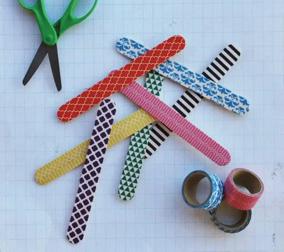
. First put the super glue on one side of the lollipop sticks
. hen stick the lollipop stick on the plastic pot or tin can one by one all the way round.
. After that, decorate the wooden sticks by adding gems, glitter, ribbon, washi tape or anything you want!
. Finally let it dry, and your pen/pencil holder is ready!
Maryam | 47

48 | Maryam
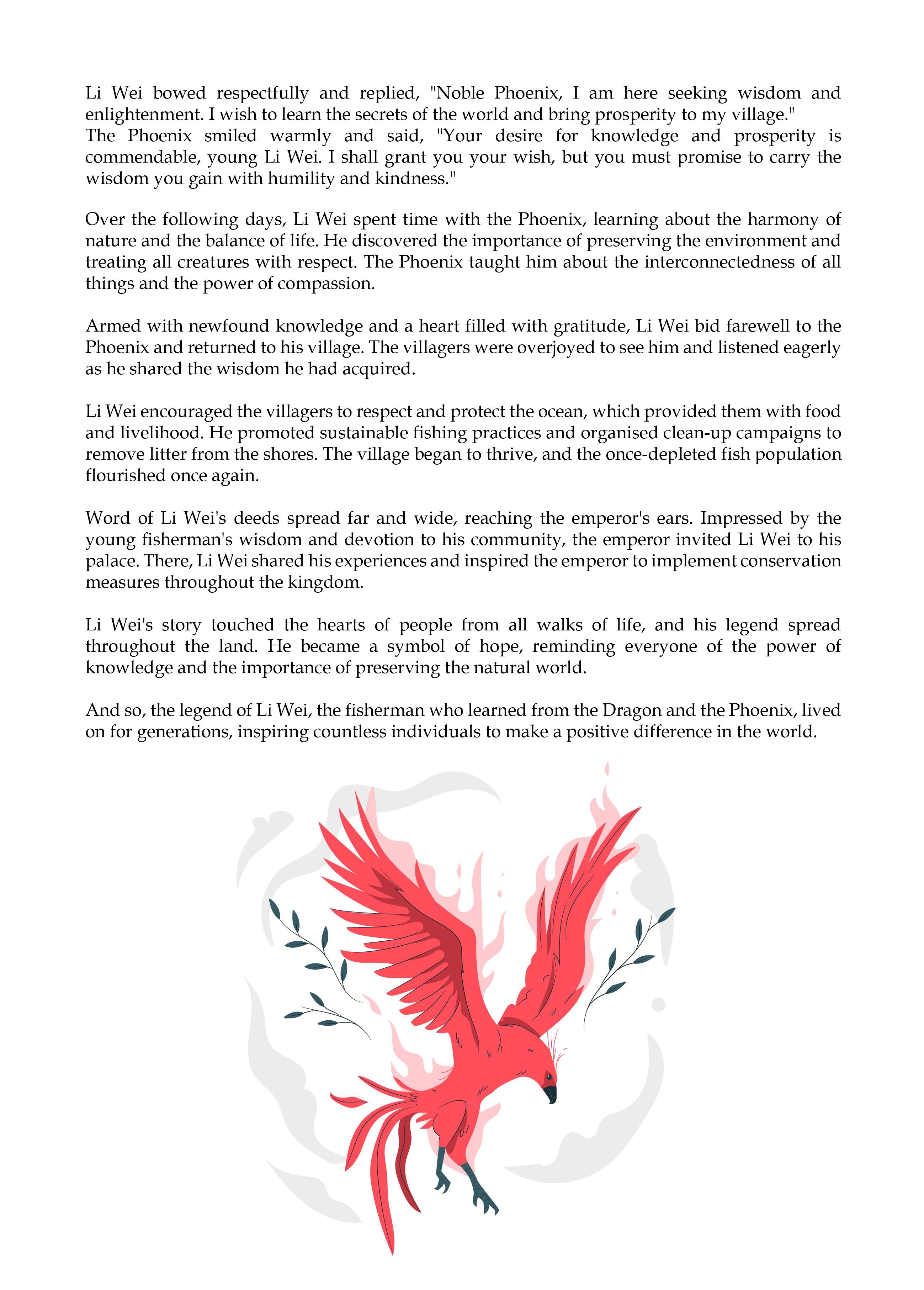
Maryam | 49
Waaqifaat-e-Nau with Beloved Hazoor aba
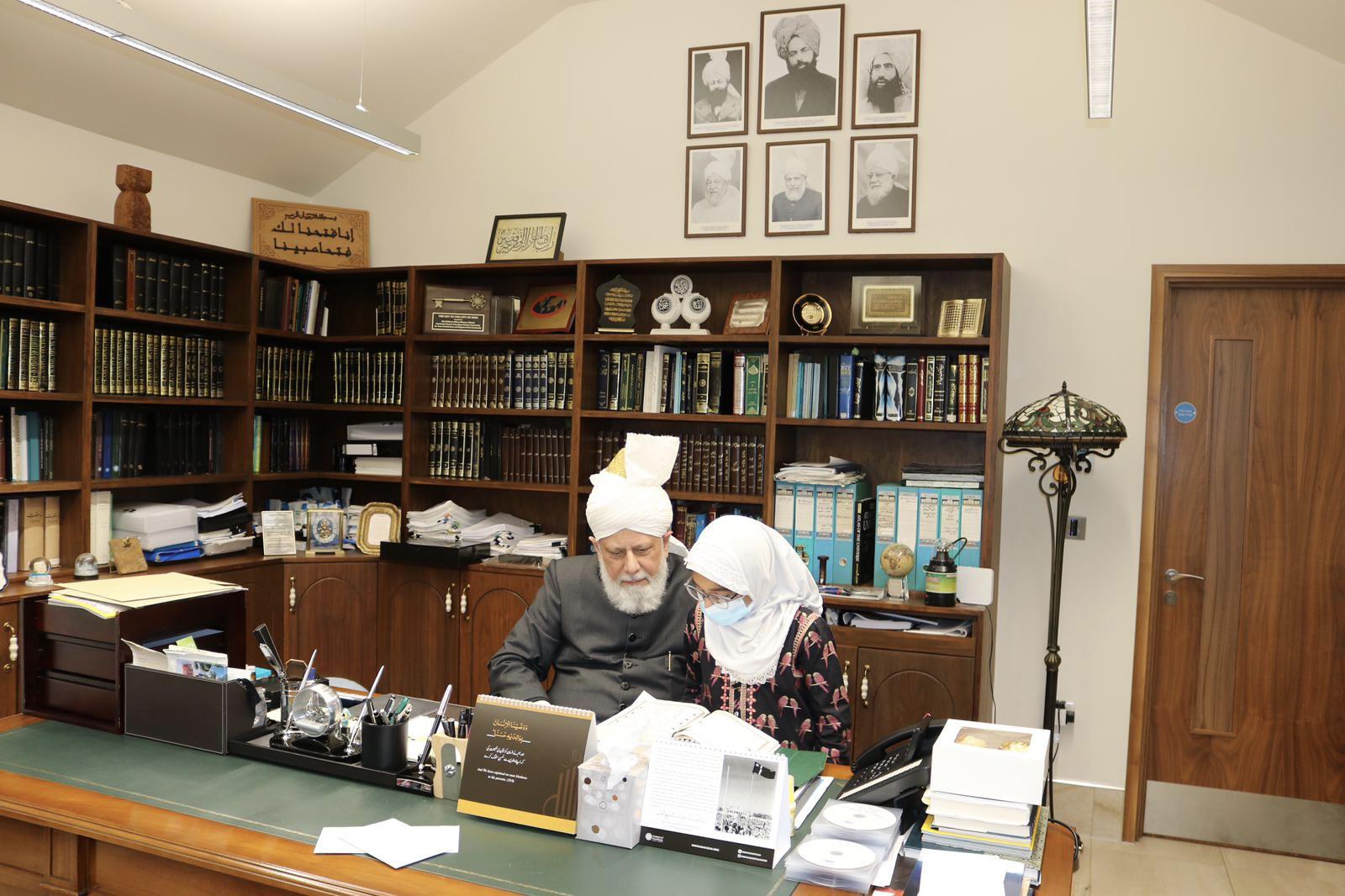
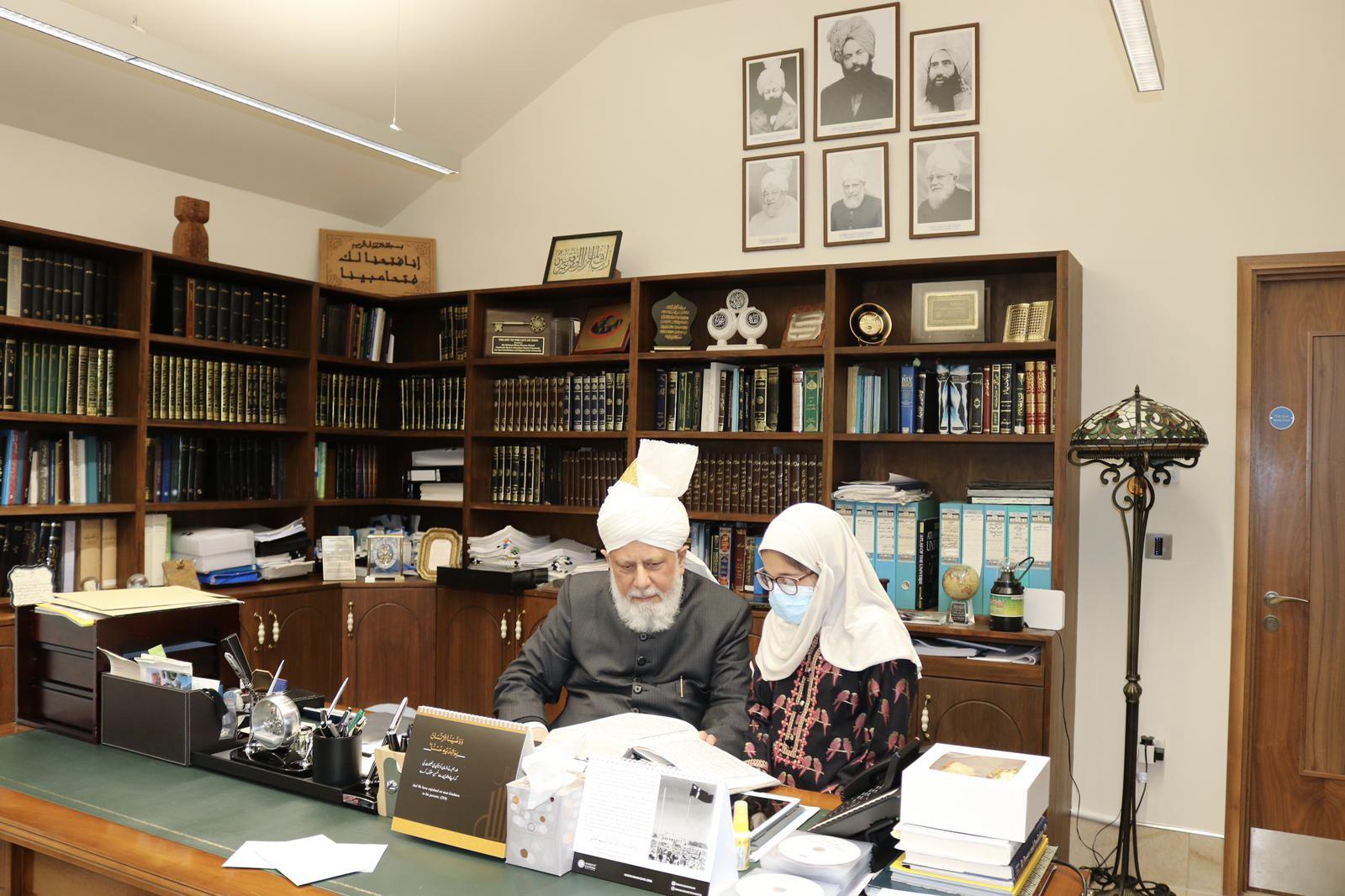
Am n Experiences Am n Experiences
My name is Ayesha and I am 9 years old. I would like to share with you my incredible experience of having my Ameen with Hazoor (may Allah be his helper). This was not just my Ameen, but also my sister Aaliya’s, who is 7 years old. My family and I had the honour of meeting Hazooraba in a Mulaqat. Hazooraba graciously allowed me and my sister to read with him. I’d been waiting for this moment for a long time and I couldn’t believe it was fnally happening.
In the Mulaqat, Hazooraba frst asked my sister to come to him with her Holy Qur’an. I could see Aaliya looking anxious. But Mash’Allah she did so well I was the proudest sister ever. Next it was my turn, I remember feeling both nervous and excited. As I walked up to Hazooraba, he smiled at me warmly and all my nerves melted away. Looking back on that day, I realise how blessed my sister and I were to have had the opportunity to meet Hazooraba and have our Ameen. It was a moment truly special, one that we will cherish forever!
Ayesha Ahmad and Aaliya Ahmad
50 | Maryam
I was fortunate enough to have my Ameen with beloved Hazooraba on the 7th of November 2021.
I still remember being incredibly nervous as we walked into Hazoor’saba offce for our family Mulaqat. After speaking for a short while, I was told to come closer to recite a part of the Holy Qur’an. I became even more nervous and despite trying my best I still managed to make a mistake whilst reading, but despite feeling awful about it, beloved Hazooraba was so nice to me regardless of it and listened to me with such patience and kindness. Once I had read a portion of the Holy Qur’an, beloved Hazooraba advised that I never stop reciting the Holy Qur’an and try to read it daily.
After that, I mustered the courage to request beloved Hazooraba to kindly sign my Holy Qur’an, which he very generously did – in fact, he did not only sign it, he also rolled a brayer on it! I still cherish this wonderful memory and feel so grateful that I also have his beautiful signature as a constant reminder of that blessed day, Alhamdulillah

May Allah always grant our beloved Khalifa a long and healthy life and enable us to fulfl our waqf to the best of our abilities, Ameen.
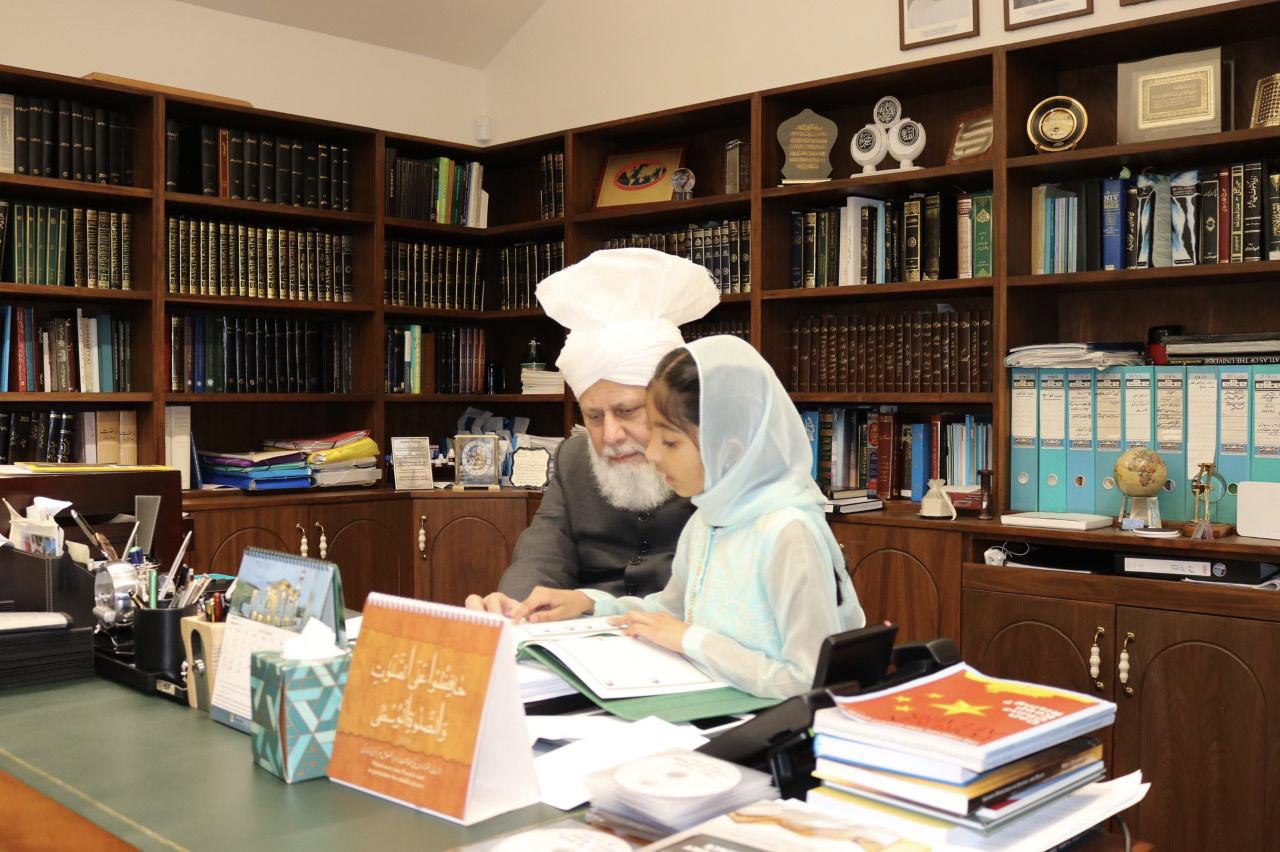 Michelle Muzamil
Michelle Muzamil
Maryam | 51
During the Covid-19 pandemic lockdowns my brother and I were set a challenge by my mum – to fnish the frst reading of the Holy Qur’an. My brother managed to fnish it during the frst lockdown and I fnished my frst reading during the second lockdown, when I was 5 years old. We decided to have a family celebration on Zoom. But our celebration was incomplete as I really wanted my Ameen to be done with Hazooraba, just like my mum had when she was a little girl.
My parents wrote to Hazooraba to request a Mulaqat when lockdowns were lifted. In October 2021 we were blessed with the opportunity for a family Mulaqat. During the Mulaqat my brother told Hazooraba that we had both fnished our frst readings of the Holy Qur’an and could we, whenever possible, have our Ameen with Hazooraba. Hazooraba asked us if we had brought our copies of the Holy Qur’an with us but we hadn’t! Hazooraba turned his seat around, facing the shelves behind his desk and pulled out one of his own copies of the Holy Qur’an. He then asked my brother and I to come up in turns and recite a small portion of the Holy Qur’an. My brother went up frst and read so well and confdently. I was so proud of him. I was so nervous when I went up but I took a deep breath and went for it. Alhamdolilah it went well. After that, Beloved Hazooraba smiled warmly and said in Urdu: ‘Lo ho gayi Ameen’. Hazooraba then gave us a chocolate and pen each. It was one of the most special and memorable days of my life. I love our Hazooraba. He is the kindest man in the world. May we always make our Beloved Hazooraba happy by becoming good Waqfe Nau children. Ameen.
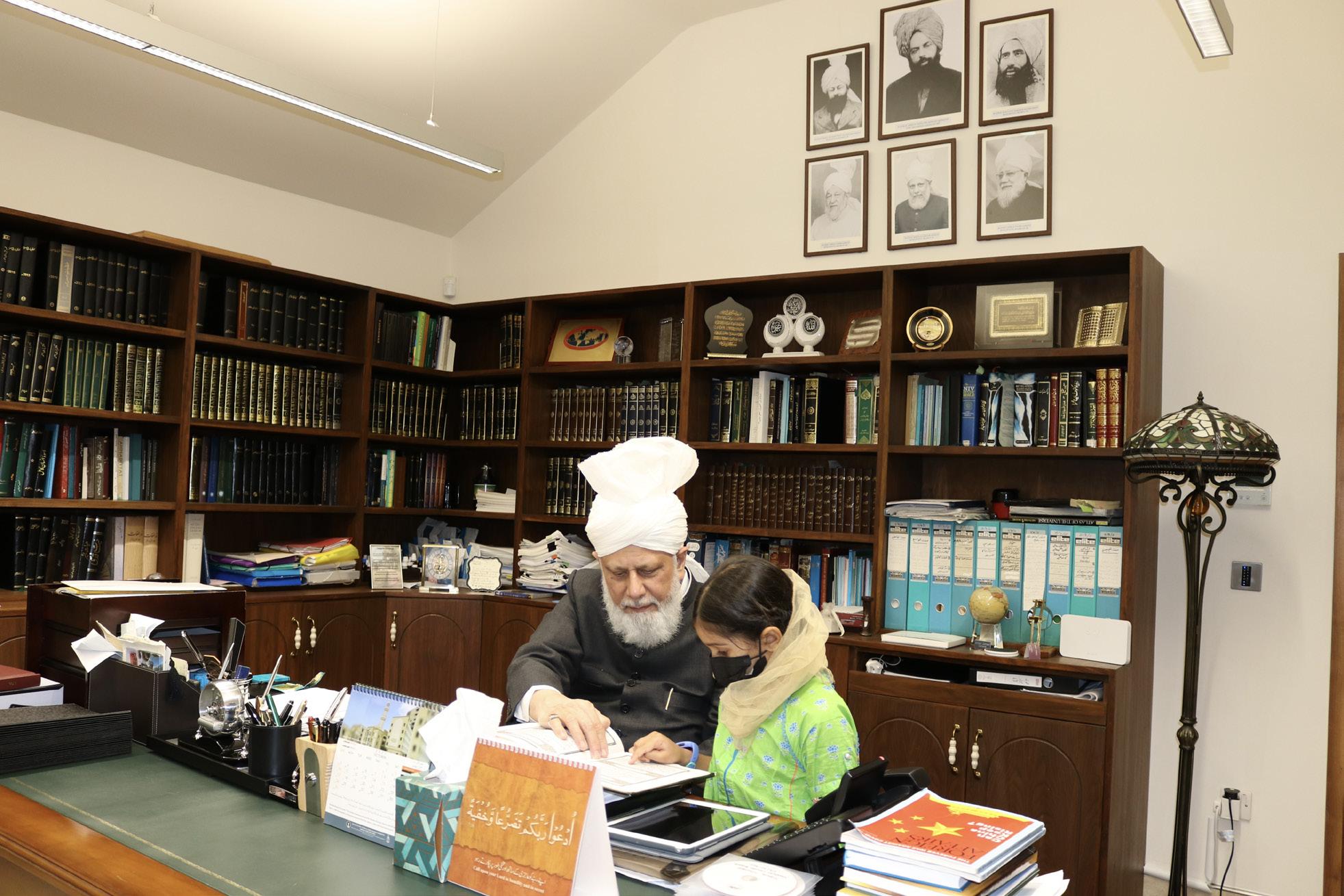 Syeda Zubariyah Anwar, Age 7
Syeda Zubariyah Anwar, Age 7
52 | Maryam




 Hazrat Ha kim Maulvi Nooruddin, said: ra Kh alifatul Masih I
Hazrat Ha kim Maulvi Nooruddin, said: ra Kh alifatul Masih I




 MATCHLESSNESS OF THE HOLY QUR’AN
MATCHLESSNESS OF THE HOLY QUR’AN

















 Prepared by Al Hakam https://www.alhakam.org/waqifaat-e-nau-uk-ijtema-2023/
Prepared by Al Hakam https://www.alhakam.org/waqifaat-e-nau-uk-ijtema-2023/














 By Ayesha Mahmood Malik
By Ayesha Mahmood Malik

 By Laiqa Bhatti
By Laiqa Bhatti


















 Michelle Muzamil
Michelle Muzamil
 Syeda Zubariyah Anwar, Age 7
Syeda Zubariyah Anwar, Age 7